Gas REGISTERED THE ONLY OFFICIAL INDUSTRY PUBLICATION Issue 164 November 2022 Technical back to basics Gas safety record checks, gas rating smart meters & notification WIN: 3 Salamander TapBoost pumps up for grabs Gas Safe news Warning on new home danger zone CO alarms: what are the new rules?



† In a recent customer survey, 105 out of 116 respondents (90.5%) answered ‘Strongly Agree’ and 11 out of 116 respondents (9.5%) answered ‘Agree’ to the question “I would recommend HWOS to others” * Subject to availability and location. Order cut-off times vary by courier and day of the week. Certain bank holidays excluded. See hwos.co.uk for details. www.hwos.co.uk • 01388 760 333 • sales@hwos.co.uk Gas, LPG, Oil & Heating Spares • Shipped and Delivered 7 Days a Week.* www.hwos.co.uk • 01388 760 333 • sales@hwos.co.uk Gas, LPG, Oil & Heating Spares • Shipped and Delivered 7 Days a Week.* Mike, Your Heating A great company that seems to keep improving and moving with the times The staff on the phone are always really helpful and cheerful Keep up the good work! We think our service is out of this world, but don’t just take our word for it100% of our customers would recommend us to others.† We think our service is out of this world, but don’t just take our word for it100% of our customers would recommend us to others.†




In this issue REGISTERED GAS ENGINEER Issue 164 November 2022 04 Gas Safe news Gas Safe warning to consumers on danger zones in their new homes 07 News Heating engineers not consulted over energy savings, survey finds; government signals that fracking can restart; warning over huge rise in meter tampering; steps set out to develop a hydrogen future 15 The good, the bad and the ugly 19 Letters 20 Industry Standard Update 112 IGEM/G/13 Domestic supply capacity and operating pressure at the outlet of the meter Competition 3 chances to win a new TapBoost pump from Salamander Win Page 51 23 Carbon monoxide awareness New CO alarm rules now in force in England; the Parliamentary work that goes on behind the scenes to push for improvements in the law; CO safety for vulnerable people; The CO Research Trust’s work to improve understanding of CO by commissioning, funding and sharing specialist research 31 Technical back to basics Landlords’ gas safety record checks; gas rating smart meters; notification made simple 21 Industry Standard Update 113 IGEM/G/11 Edition 2 with amendments: Gas Industry Unsafe Situations Procedure (GIUSP) 39 Water heating The untapped potential for energy storage that’s already in more than 9 million UK homes; heating water the hybrid way 42 Your business How to create a website that works for you 44 Underfloor heating Future-proof your customers’ heating 46 Products The latest launches from DeWalt, Flamco, Knipex, and Tado 36 Energy efficiency What will help people decarbonise their homes? www.gassaferegister.co.uk 03
FROM
There are signs that householders are turning to desperate measures to save money this winter. The Energy Networks Association, which represents the network operators, has warned that it’s already seen an increase in tampering with gas and electric meters, with potentially devastating results.
One recent survey has found that, despite their worries, people are not asking their heating engineers for advice on ways to reduce their energy bills; they’re more likely to turn to their energy provider. And another highlights that they’re tightening their belts and planning to cut spending on going out, shopping and holidays.
There’s been a good deal of guidance on how to shave money off energy bills, whether it’s turning down the thermostat, fitting the latest controls or turning down the flow temperature on combis. Energy companies, consumer organisations and our industry’s manufacturers have been quick to respond and provide advice for people who are seriously worried about how they can afford to stay warm this winter. But as the cold weather kicks in and boilers break down, it will be gas engineers to the rescue of the UK’s households again.
Nicki Shearer, editor
Gas Safe Register, PO Box 6804, Basingstoke, RG24 4NB.
Email: enquiries@gassaferegister.co.uk, register@gassaferegister.co.uk or technical@gassaferegister.co.uk
Managing editor: Scott Darroch scott.darroch@gassaferegister.co.uk
Editor: Nicki Shearer
Jennie Ward
Publisher:
Technical
Production:
McCreary
Banister,
Additional
The
Registered
behalf of Gas Safe Register. 30 Park Street, London, SE1 9EQ
CIRCULATION: Jan-Dec

Unsafe gas appliances are most commonly found in homes that have changed hands recently, according to Gas Safe Register’s latest gas safety inspection figures. This has prompted warnings of a ‘new home danger zone’ for this year’s 800,000+ new homeowners who may be putting on the heating in their new home for the very first time.
Of properties where inspectors found faulty gas appliances over the past year, almost half (47 per cent) had new owners in the past five years, over one-quarter (26 per cent) had been bought in the two years before the inspection, and 17 per cent had changed hands in just the past year.
The findings are supported by new research carried out with 1,700 gas engineers, nearly all of whom (94 per cent) want greater priority on gas safety in the home-moving process. Two-fifth of gas engineers say the first year of owning a property is a particular danger for home and family gas safety. Engineers attribute this to new owners being unaware of key information, including where to switch off the gas in an
emergency, the safety record of gas appliances, and whether their new home has a working CO alarm.
Gas Safe Register has joined forces with TV presenter Dion Dublin, and major players in the homes sector, including HomeOwners Alliance, Neighbourhood Watch and RoSPA (the Royal Society for the Prevention of Accidents), to highlight the ‘new home danger zone’ and help everyone be more gas safety-savvy at home, regardless of whether they’re brand new to their property or have been living there for decades.
Get to know your gas Dion Dublin says: “From buying and selling properties over the last 20 years, I know just how stressful moving can be, as well as keeping a property up and running – especially in the colder months. But the excitement of finally getting those keys and dreaming about your interior decorating plans can mean that less exciting aspects of a move – like health, wellbeing and safety – unintentionally take a backseat. No one wants something to go wrong with
Warning on Support for gas
Following the death of Her Majesty The Queen in September, Gas Safe Register suspended its Gas Safety Week activities as a mark of respect; it was due to take place during the official mourning period.

More than 4,500 organisations had pledged their support to the industrywide campaign, and we know that many rescheduled and modified their activities. Here is just a taster of the different ways they got involved.
Gas Safety Week next year will be on 11-17 September, so save the date and we’ll keep you updated on plans for 2023.
Family business LH Cook Plumbing & Heating set themselves up at Hunsdon Village Hall in Hertforshire. Marketing manager Ben Sanderson says: “We did a Gas Safety Week speech [in which] we went through the signs of what to look for as signs of boilers going wrong, as well as what gas engineers can do to help people stay safe around gas appliances.”
editorial@registeredgasengineer.co.uk News:
news@registeredgasengineer.co.uk
Peter
publisher@registeredgasengineer.co.uk
consultants: Carl
Stephen Gallagher, Jonathan Palmer
Mark Turpin Advertising enquiries only: Ian Carter ian@rgemagazine.co.uk
print subscriptions £25 per year email: wgardiner@circdata.com, Tel 01635 869 868
views expressed in this magazine are not necessarily those of Gas Safe Register. The publishers will accept an advertisement or other inserted material only on the condition that the advertiser warrants that such advertisement does not in any way infringe copyright or contravene the provisions of the Trade Descriptions Act. All copy is subject to the approval of the publisher, who reserves the right to refuse, amend, withdraw or otherwise deal with advertisements submitted to it at its absolute discretion and without explanation. All advertisements must comply with the British Code of Advertising Practice. ABC membership approved 19 March, 2009.
Gas Engineer is written, designed and published by The Team on
2021 80,070
THE EDITOR Comment
04 November 2022
new home danger zone
the most crucial information that homeowners should know about gas safety.
Homebuyers’ guide to gas safety basics

their new home, which is why I want everyone to get to know their gas better this winter.
“My one piece of advice? If you’re moving into a new home, there are things that you should be aware of and have the confidence to ask about. Never assume the gas appliances are safe and in good working order. It’s always better to get them safety checked during the moving process or as soon you settle in, rather than wait until something goes wrong later down the line.”
Gas Safe Register is also pushing for gas safety advice to be given more prominence in popular home-moving resources after it found that none of the top 20 home-moving guides found via Google mention any of

The Register’s chief executive Jonathan Samuel says: “With the pressure of the cost-of-living crisis, people may delay putting on their heating this winter. The clocks going back often prompts people to start to use their heating, so we are urging householders to get clued up on the gas safety basics now, especially if they’re approaching their first winter in a new home, or if price increases are making them consider avoiding gas safety actions they would usually take, like getting gas appliances serviced.
“We’re urging all householders – especially new homeowners and people who are currently in the home-buying process – to be aware of the signs and symptoms of unsafe gas appliances, and always making sure a Gas Safe registered engineer is used for any gas work, including for annual gas safety checks.
“It’s time to make gas safety a priority when moving home, so we don’t put our loved ones, new properties or even our new neighbours in danger.”
• Prepare: find out where your gas emergency control valve is located, so you can quickly switch the gas supply off in an emergency
• Paperwork: ask the current owners for all records they have about installation, maintenance and safety checks for their household’s gas appliances and gas pipework
• Peace of mind: if they can’t provide a record, or it’s been more than 12 months since the last check, get in touch with a local Gas Safe registered engineer who can carry out a safety check for you
• Play it safe: only Gas Safe registered engineers are experts in gas appliances, flues and pipework. Your homebuyer or structural surveys might not confirm if the gas appliances in your new property are working as they should be: get them checked to be on the safe side
• Pause use: if you’re worried about any gas appliances in a new home, don’t use them until you’ve had them checked out by an expert. Signs that something could be wrong include lazy yellow flames, black marks or sooty stains on or around the appliance, increased condensation or intermittent pilot lights
• Perfecting your home: if you’re doing work to your home after you’ve moved in:
– Don’t try to fit, fix or move gas appliances such as boilers, cookers or fires yourself. Use a Gas Safe registered engineer
– Don’t block or cover air vents and flues: your gas appliance will need ventilation to work safely
– Before drilling, hammering or putting screws into a wall or floor, check what’s behind.
safety across the industry
The customer service team at online boiler installation company iHeat made sure they were up to date with their own knowledge about how to stay gas safe with this year’s Gas Safety Week posters and leaflets. The company also shared important gas safety messages in a new blog on its website.

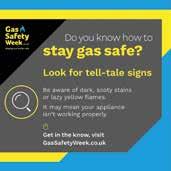
CO and smoke alarm specialist Kidde highlighted Gas Safety week prominently its website, taking full advantage of the easy-to-use graphics in the free supporters’ toolkit. The company also created a useful factsheet on the risks of carbon monoxide and added a blog about the importance of making sure that gas appliances are maintained, and highlighting the need for a carbon monoxide alarm.
Distributor Mark Vitow and Tesla UK teamed up to offer special deals on safety products and proudly showed the Gas Safety Week logo, creating a banner to use on social media.
Property sale and rental specialist Savills added a blog about the legal responsibilities of landlords providing gas appliances for use by their tenants, as well as the measures that everyone should take to stay safe from the dangers of gas in their homes.
Landlord compliance company Quinnergy got behind the campaign with a blog that highlighted 12 years of Gas Safety Week and the importance of regularly maintaining gas appliances. The company, which provides energy care packages, listed the five most important gas safety measures that all homeowners can take.
www.gassaferegister.co.uk 05 REGISTERED GAS ENGINEER | GAS SAFE REGISTER NEWS







WiFi Inside 20% Hydrogen
HMRC Self Assessment reminder
HMRC wants to help you get your tax right. You’re responsible for telling HMRC about your income using Self Assessment if you’re:
• Self-employed as a sole trader earning more than £1,000
• A partner in a business partnership
• A director of a limited company.
If you’re not already registered for Self Assessment but should be, you need to do this as soon as possible.
For more information about Self Assessment and registering, go to GOV.UK and search ‘Register for Self Assessment’.
If you met the criteria for Self Assessment in the 2021-2022 tax year, the deadline to submit your Self Assessment tax return online is 31 January 2023.
If you pay Self Assessment tax through your PAYE tax code, you must submit your Self Assessment tax return online by 30 December 2022. This only applies if you’d like HMRC to collect the money you owe in tax from your wages and pension contributions.
To check whether you’re eligible to pay through your tax code, go to GOV.UK and search ‘Pay your Self Assessment tax bill’.
HMRC is encouraging customers to plan ahead to give themselves the best chance to complete their Self Assessment tax return on time.
Customers who file early will benefit from knowing what they owe, allowing them to budget and pay at a time that suits them. If customers are due a refund, they could get it back quicker.
4 in 5 don’t ask heating professionals for advice on cutting energy bills
Nine in ten Brits say they are concerned about rising energy costs, according to a survey of 1,000 homeowners. The poll, carried out by Resideo, also found that more than a onequarter (28 per cent) have turned off their central heating to reduce energy bills, but just 13 per cent have installed a heating control.
The level of concern differed between age groups, with 58 per cent of 34-44 year-olds and 65 per cent of 45-54 year-olds saying they are very concerned. Younger people are the most worried, with 76 per cent of 18–24 year-olds saying they are concerned by rising costs.
Some 40 per cent say they would turn to their energy provider for advice on reducing their energy bills, while just under one-fifth would contact a heating professional. Those aged 18-24 are most likely to turn to a professional: almost one-third say they would ask a heating installer for advice on cutting their energy bills.
The results highlight that many people are actively looking for ways to reduce their energy bills through heating controls such as
thermostats. Almost 70 per cent of 25-34 year-olds would spend money on the latest heating controls if it meant they could save money in the long term.
Resideo’s Martin Wilson says: “This survey has confirmed that UK homeowners are increasingly concerned about their bills and are proactively looking for ways to reduce them. While homeowners are prepared to invest in thermostats to help mitigate their bills, they are much more likely to go to their energy provider for advice on reducing bills.”
Meanwhile, research by Worcester Bosch has found that people are changing their spending habits and getting ready to cut down on their heating and food. Just over half of homeowners are worried
specifically about their heating, how they plan to feed their family and whether they will be able to afford necessities.
They are saving extra cash by cutting back on socialising (71 per cent), shopping (66 per cent), and planning holidays (58 per cent). However, three-quarters still believe that they may not be able to afford their household bills in 2023.
Martyn Bridges, director of Technical Services, says: ‘‘There is no doubt that this winter will be difficult for us all and although the two-year freeze on bills will be helpful, the [energy price increase] is still very concerning.”
Worcester Bosch has set out some tips to help lower energy bills at: www.worcester-bosch. co.uk/gas-bills
‘Brits making tough decisions on gas safety’
A worrying number of householders are either turning a blind eye or are ill-informed when it comes to gas safety in their home, new research from Alpha has found.
The survey, carried out at the end of last year, showed that 63 per cent do not check and replace the batteries in their CO alarm and more than 40 per cent are failing to have their annual boiler service, simply because it costs too much.
Beware of fast track training, says BPEC
Beware of training providers that offer short cuts to becoming a gas engineer without giving learners the proper work experience or time needed to gain vital skills and knowledge, says training and assessment provider BPEC.
There are two primary training routes for new entrants looking to become a gas engineer: the Gas Engineering Apprenticeship or the Gas Managed Learning Programme, both of which culminate in ACS assessment.
Both training routes not only require extensive work experience alongside a qualified Gas Safe registered engineer, but also take a substantial amount of time to
gain all the necessary skills and knowledge to become a fully qualified gas engineer.
Some training providers offer short-cut training solutions in order to ‘fast track’ new entrants into the industry, says BPEC. Its CEO Neil Collishaw adds: “Quicker and cheaper is not the way. Those providers cutting corners are not only doing learners a disservice but also the industry, by turning out people who are not fully trained.
“We encourage those looking to enter the industry to research courses carefully and ensure you will receive sufficient practical and real-life experience over a period of time.”
Bulletin 071 withdrawn
Technical Bulletin 071 –Checking the operating pressure of the meter regulator (Natural Gas) has been withdrawn. This is because the information has been superseded by that contained in IGEM/G/13 –Domestic supply capacity and operating pressure at the outlet of the meter, which was published on 1 September 2022.
• You can read Industry Standard Update 112 on IGEM/G/13 on page 20.
www.gassaferegister.co.uk 07 REGISTERED GAS ENGINEER | AROUND THE INDUSTRY
Technical
Fracking can restart, says government
The UK government has lifted the moratorium on shale gas production in England. It has also confirmed its support for a new oil and gas licensing round.
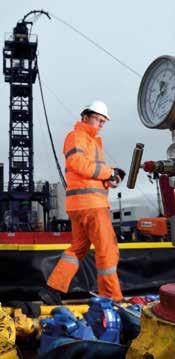
It says it is taking steps to increase domestic sources of energy, reduce the UK’s reliance on foreign imports and explore options to boost domestic energy security.
Business and Energy
Secretary Jacob Rees-Mogg said: “In the light of Putin’s illegal invasion of Ukraine and weaponisation of energy, strengthening our energy security is an absolute priority, and – as the Prime Minister said – we are going to ensure the UK is a net energy exporter by 2040.
“To get there we will need to explore all avenues available to us through solar, wind, oil and gas production. So it’s right
that we’ve lifted the pause to realise any potential sources of domestic gas.”
The government has formally lifted the pause on shale gas extraction and will consider future applications for Hydraulic Fracturing Consent where there is local support. Developers will need to have the necessary licences, permissions and consents in place before they can start operations.
The decision comes alongside the publication of the British Geological Survey’s scientific review into shale gas extraction, which was commissioned earlier this year. The review recognised that there is currently limited understanding of UK geology and onshore shale resources, and the challenges of modelling geological activity in relatively complex geology.
Only three test wells have been hydraulically fractured in the UK so far. The government says more sites need to be drilled in order to gather better data. Lifting the pause on shale gas extraction will enable drilling to gather this further data, building an understanding of UK shale gas resources and how extraction can be carried out where there is local support.
The new oil and gas licensing round is expected to lead to more than 100 new licences. A number of new ‘blocks’ of the UK Continental Shelf are likely to be made available, for applicants to bid for licences.
These licences will enable developers to search for commercially viable oil and gas sources within the areas of their licences. Developers will still need to seek regulatory approval.
Get business-smart with Vaillant smart talks
Vaillant’s new bite-size, on-demand ‘smart talks’ cover a wide range of useful marketing and business development topics, hosted by experts. They’re designed to fit into your work schedule and you can access them free at any time via the Vaillant Academy.
Each video provides support in a specific area of your business, such as developing a brand, social media and digital marketing, and customer acquisition and retention. Nine smart talks are
available in the first phase.
Vaillant marketing director Alice Woolley says: “When it comes to running a business, it can be difficult to carve out the time to invest in yourself and your brand. This is why marketing advice can often prove to be just as valuable as technical product knowledge.
“This new series follows on from the success of our Business Clinic series of events and online webinars. The videos have been designed to offer an easily
accessible, on-demand business tool to enable installers to really enhance their business proposition, from building their brand from scratch, upskilling in a specific area or looking to train their own team.
“We’ve designed the smart talks series to be as accessible as possible because we recognise setting time aside for training can be difficult. By hosting these online, installers can watch and listen at a time that suits them.”
Inclusivity win for LCL Awards

LCL Awards won Training Initiative of the Year at the 2022 HVR Awards for its Inclusivity Charter. The voted-for category saw the awarding organisation win for its initiative, which encourages approved centres to promote respectful behaviour and flexible course delivery so that more people can access training.
The Inclusivity Charter was launched in April, in response to the lack of women and other under-represented groups in building services engineering. It was developed with Hattie
Centres that sign up to the charter must first review where they are in terms of inclusivity,
from not tolerating offensive language, to developing courses that can be delivered online, in the evening or at weekends to suit the needs of parents – as well as for those who need to fit training in around their day job.
Director Mark Krull says: “Overall, the BSE sector is experiencing a skills shortage. We need more people if we are going to meet the demand presented by a low-carbon future. Varied viewpoints and life experiences will also progress our industry for the better.”
The barriers stopping tradespeople from training
Almost half of UK tradespeople say they want to do more training but can’t because of barriers including time and finances.
Half say they enjoy learning new things, but one in eight have reached a stage where they rarely do so any more. This is largely due to the obstacles such as a lack of awareness. Almost one in seven (13 per cent) say that they wouldn’t know where to look for development opportunities.
The money and time required are also discouraging, as is social pressure. One in 12 (8 per cent) say they don’t ask for more training as they worry what other people would think of them.
Such barriers are significant, as less than one-fifth of tradespeople say their initial training was enough to set them up fully for their career, highlighting the importance of continuous learning.
IronmongeryDirect surveyed 500 trade workers to reveal the appetite for professional development.
08 November 2022
REGISTERED GAS ENGINEER | AROUND THE INDUSTRY
Hasan MBE, founder of all-female plumbing business Stopcocks Women Plumbers.
L-r: Louise McHugh, Breathing Buildings; Mark Krull, LCL Awards; awards compere Hal Cruttenden
Photo: Cuadrilla
Trading Standards Approved

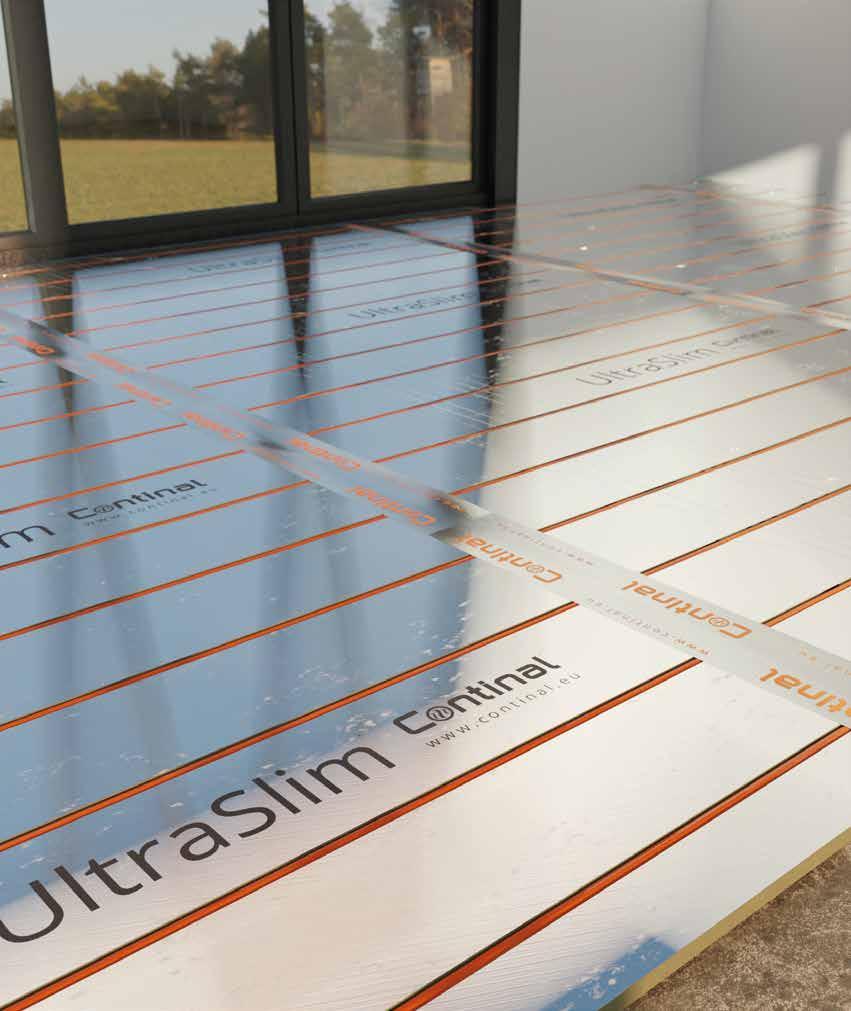
0333 800 1750 www.continal.co.uk
You know you can buy with confidence. Trusted UFH supplier for over 20 years and tens of thousands of systems installed. One point of contact for all your UFH needs, your project manager is here to help you. 20 years without a system failure Free UFH trade training Dedicated UFH Expert UK’s widest range of UFH

New Catalogue Out Now! Request your FREE copy online Over 12,000 quality products IN STOCK for next day delivery. Request your FREE catalogue online ElectricalDirect.co.uk or call 0300 303 88 26 Check out our sister company IronmongeryDirect.co.uk Request your FREE catalogue online
Energy networks warn of huge rise in meter tampering
There has been an almost 400 per cent rise in incidents of meter tampering and interference with electrical equipment, energy operators say. And they warn that the trend will continue to rise.
Illegal meter tampering was identified as the cause of a fire that gutted a property in Glasgow and led to a woman’s death. Police say the fire was started by a spark from a prepayment meter that had been bypassed illegally.

The rise in tampering and electrical equipment interference means that householders are at risk of further incidents, says the Energy Networks Association (ENA), which represents electricity and gas network operators.
Operators are seeing DIY attempts at meter tampering that frequently lead to live electricity conductors
being exposed or unsealed holes in gas supply pipes.
David Spillett, ENA’s head of Safety, Health and Environment, has issued a warning to households, saying: “Tampering with your meter can create a ticking time bomb in your home.
“The UK’s electrical and gas engineers are highly trained professionals who ensure your home’s power system is entirely safe. Tampering with their work risks serious harm to yourself, neighbours and your loved ones and damage to your property that will not be covered by insurance. It’s just not worth the risk.”
Peter Smith, director of policy at fuel poverty charity National Energy Action, says: “Given the recent relentless increases in energy bills, we know 6.7 million
UK households are now in fuel poverty.
“The crisis is fuelling many types of unsafe and dangerous coping strategies in the home as millions try and adjust to record high bills.
“This worrying research indicates tampering with energy meters is now on the rise and while
the motives, scale and the impact of related injuries or incidents are still largely unknown, it’s right to warn people of the risks.
“Meter tampering can be exceptionally dangerous and in extreme incidents can be life-threatening, not only to the perpetrators but also nearby neighbours.”
Daikin installers can now access heat pump finance
Daikin’s approved heat pump installers can now offer homeowners flexible payment options, thanks to a new partnership with back-office support app Hiber.
The partnership aims overcome one of the barriers to achieving the government’s target of 600,000 heat pump installations by 2028. The flexible
payment options enable installers to offer homeowners alternative ways to finance heat pump and air conditioning installations. They can quote for the job using Hiber and, once the customer has accepted, will be able to direct their customers to the Hiber portal for a range of payment options.
Daikin UK managing director
Stelrad van takes to the road
Watch out for Stelrad’s upgraded training van at a merchant near you, taking radiators on the road

from the Vita, Softline and Henrad range.
“It’s a great training tool, allowing installers and merchant staff to get up close and personal with our wide range of radiators,” says marketing communications manager Sarah Baker.
“Installers can see and touch the actual radiators they are being offered by their merchant and get information for every product they see from the brand specialist. It’s a simple approach but makes the visits to the merchants so much more worthwhile.
“Product training and familiarity is available on tap at every stop the van makes up and down the country.”
Hiroyasu Ishikawa says: “The decision to install a heat pump is a complex and considered one, with some barriers in the way of consumer decision-making. This new partnership strips away at least one barrier by offering a competitive new way to pay, as well as offering a new flexibility to our installers and our heat pump customers.
“We need to be able to offer consumers access to affordable finance options that allow them to spread the cost over a number of years. This partnership between ourselves and Hiber will help break the mould of how we offer finance to consumers and make an important contribution towards the upgrading of the UK’s housing stock.”
Autumn offers from Testo
Testo is offering its new Smart and Ultra Smart kits at special introductory prices. The Testo 300 can now wirelessly connect up to four smart probes, for measuring additional parameters simultaneously.

It’s also offering a five-year fixed-price service at reduced cost when you buy a Testo 327 flue gas analyser. Offers end on 31 December 2022, and terms and conditions apply.
www.testo.com/en-UK/promotion/heating
www.gassaferegister.co.uk 11 REGISTERED GAS ENGINEER | AROUND THE INDUSTRY
Steps set out to spur hydrogen development
Trade association Hydrogen UK has set out its blueprint for the continued development of the entire hydrogen value chain.
The Hydrogen Accelerators are a set of recommendations from the 50-strong industry members directed at the government to ensure the successful deployment of hydrogen in the UK. The association’s members have met regularly to discuss pinch points and next steps for the industry, resulting in the hydrogen accelerators.
Hydrogen UK is pushing for rapid scaling of production, greater support for distribution and storage infrastructure, and the creation of demand in end-use sectors. Its CEO Clare Jackson says: “Hydrogen UK’s Accelerators provide detailed steps that industry and
government must take together to fast-track hydrogen’s progress in the UK, to secure our place as a global leader, create new jobs and economic prosperity and ensure that we deliver net zero cost effectively.”
James Earl, director of Gas at the Energy Networks Association, which represents the UK’s gas and electricity networks, says: “Our gas networks are creating
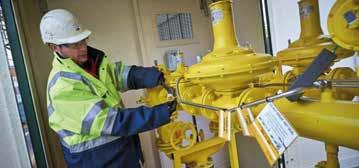
the world’s first zero-carbon gas grid by speeding up the switch from natural gas to hydrogen for the 85 per cent of UK households connected to the gas grid.
“For this to work, we need the whole hydrogen value chain to grow simultaneously, with production and demand developing alongside a network to transport that hydrogen from one to the other.”
300 safety checks carried out for Redcar H2 proposals
More than 300 properties in Redcar have had gas safety checks and property surveys completed as part of the region’s hoped-for hydrogen revolution.
Gas engineers have been carrying out free surveys and safety checks in homes and businesses in Warrenby, Coatham and parts of Kirkleatham.
NGN’s Hydrogen Programme manager Fergal O’Donovan says: “We’re delighted that so many residents and business owners
are playing their part in supporting us to secure investment in hydrogen for Redcar by signing up for a survey of their property.
“With colder weather looming, the opportunity to have appliances checked over free of charge and be issued with a gas safety record, which is valid for 12 months, is a big benefit to local businesses and residents. As part of our visit, we are also able to complete minor repairs free of charge and have identified
a number of safety-related issues that we’ve been able to rectify.”
The Redcar Hydrogen Community proposal involves switching the gas supply from natural gas to clean-burning hydrogen for around 2,000 homes and businesses in parts of Redcar, including the town centre, Warrenby, Coatham and an area of Kirkleatham from 2025. A decision will be made next year on whether the project will progress.
Independent review under way into net zero
The government has launched an independent review into the delivery of net-zero climate commitments. It will focus on ensuring the fight against climate change maximises economic growth, while increasing energy security and affordability for consumers and businesses, it says.
Former Energy Minister Chris Skidmore MP will lead the rapid review of the government’s approach to delivering its net-zero target. It comes a year after the government published its Net
Zero Strategy, setting out an overarching approach to carbon neutrality. Since then, there have been major changes to the economic and political landscape: Russia’s invasion of Ukraine, historically high global energy prices and high inflation.
These changes have put huge pressures on British households and businesses and make it vital that the UK reaches net zero in a way that avoids exporting industry and emissions overseas,
says the government.
The review aims to identify new ways to deliver the legally binding target by 2050. It will consider a range of evidence, consulting widely with consumers, investors, industrial leaders and experts in various fields including energy, land use and transport.
Chris Skidmore will report to the government with a set of recommendations by the end of 2022.
Baxi ready to trial commercial H2 boilers
Baxi is getting ready for the first real-life trials of 100 per cent hydrogen boilers for commercial applications. The move follows successful trials of 100 per cent hydrogen domestic boilers at the Hydrogen Homes in Low Thornley and HyStreet at Spadeadam.
The pure hydrogen boilers will enable commercial users such as businesses and public sector bodies to tap into the potential of hydrogen, whether used on their own or in a multivalent configuration with a heat pump.
“We’re playing our part in the energy transition and that includes in commercial buildings,” says Karen Boswell, managing director at Baxi UK & Ireland.
“Green hydrogen is one way to help larger buildings decarbonise because it can store renewable power over long periods of time and help avoid heavy peak loads on the electricity grid.”
Prototypes
Baxi is preparing prototypes for real-life demonstrations in the UK and Europe, which could be live by the end of the year. The different applications of the hydrogen boiler will be demonstrated, such as when it is deployed at sites of local hydrogen generation and storage solutions, and/or in a multivalent set-up with a heat pump, in which hydrogen would cover the peak loads on the electricity grid.
This trial stage also represents a valuable opportunity to learn more about the potential of hydrogen for heating. “As we navigate the energy transition, we want to deliver flexibility for our customers,” says Karen. “We’re currently working to make our full range of commercial boilers 100 per cent hydrogen ready.
“Our Remeha commercial boiler ranges are 20 per cent hydrogen ready, but we will also be launching a conversion kit for future boilers to switch from natural gas to 100 per cent hydrogen. This will allow commercial users to prepare themselves for the energy switch.”
12 November 2022
REGISTERED GAS ENGINEER | AROUND THE INDUSTRY

Whatever you win, you’re sure to be going places. With everything from cash to an incredible holiday up for grabs – and targets tailored to your business – isn’t it time you got involved? Get started now. Scan the QR code or visit glow-worm.co.uk/mysterytrip
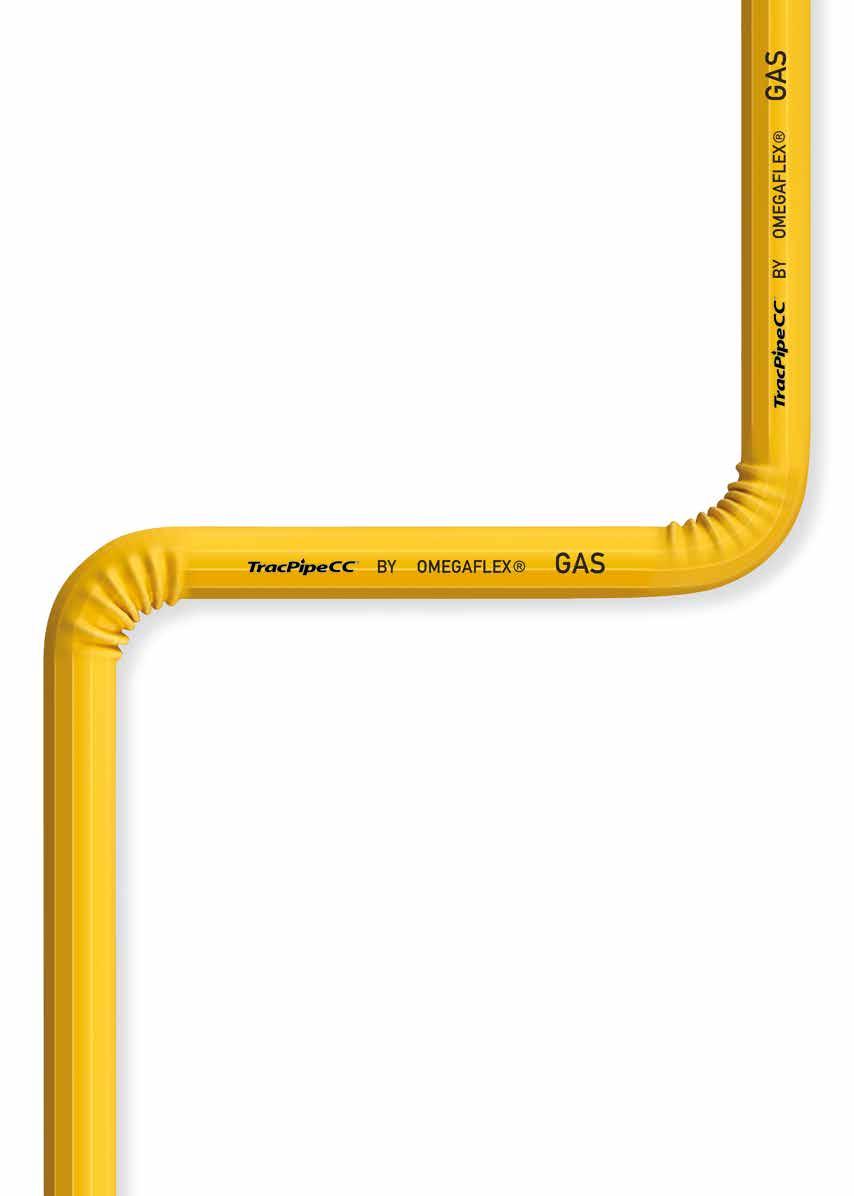
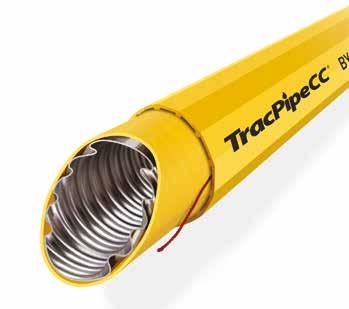


© 2018 Omega Flex, Inc. All rights reserved. FGP-771UK 10/18 FREE ON-LINE GUIDESFREE ON-SITE VISITSFREE TRAINING MADE IN BRITAIN www.tracpipe.co.uk Find out more... FREE SUPPORT We’ve got something NEW up our sleeve... TracPipe® with an integrated containment sleeve! Save time and money by not having to apply a secondary sleeve! With TracPipeCC® we’ve got it covered! Call +44 (0)1295 67 66 70 Email eurosales@omegaflex.com
Thegoodthebad+theugly
Send us your pictures
Registered Gas Engineer wants to see your pictures – whether you’ve come across some horrors or instances of really good work. Please email your stories and pictures to
or via Twitter to @RGEMag
Mark Collinson found this LPG gas pipework internally with rubber hose pipe which the tenant used to pull out of the way to keep his solid fuel log burner lit behind it. Mark made the installation safe.
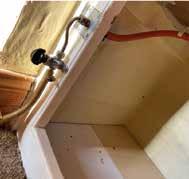
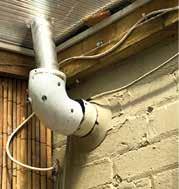
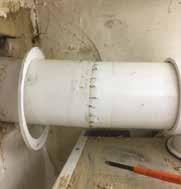
Martin Wright was carrying out a landlord’s gas safety check and saw that this gas fire was in a very poor condition because of the lack of maintenance. He made it safe.
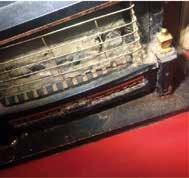
Jon Bell’s customer thought it was OK to ‘extend’ their chimney/flue due to their new canopy. Jon made safe and a new chimney/flue has now been installed correctly.
Adam Lawrence had his suspicions about the installation in this property as soon as he saw it.
On further inspection, he identified this ad-hoc chimney/flue joint. It has now been installed correctly.
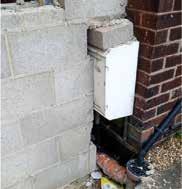
Nigel Wood found a partly built property extension during a routine gas inspection at a dental surgery. He called the Gas Emergency Provider, which attended and made safe.

www.gassaferegister.co.uk 15 REGISTERED GAS ENGINEER | YOUR PHOTOS
editorial@registeredgasengineer.co.uk
Thegoodthebad+theugly
Shafi Ebrahim was called to a boiler breakdown, which he identified was because of the lack of servicing: the heat exchanger needing cleaning, along with various other issues. The boiler has now been fully serviced.
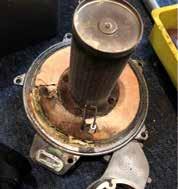
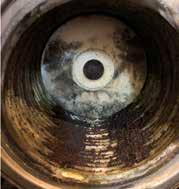
At another property, Shafi found a boiler fitted in the bathroom in very poor condition, caused by corrosion. The boiler was made safe and has now been replaced.

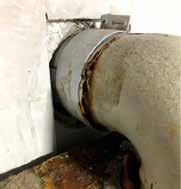
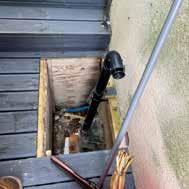
Simon Hubert was called to a CO alarm activation. He found that the chimney/flue wasn’t sealed to the wall and the plume management kit –sticking out through the decking – had been displaced from the terminal so that PoCs were re-circulating in the enclosed space. High levels of CO levels were entering the property. Simon made the installation safe and reported it under RIDDOR.
We may share some of your pictures on social media, so remember to include your contact details so we can tag you (or let us know if you’d rather we didn’t).
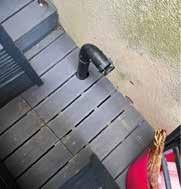
REGISTERED GAS ENGINEER | YOUR PHOTOS 16 November 2022





Recirculation Consistency Endless UP TO 3X SHOWERS AT ONCE RAPID HOT WATER HOT WATER COMFORT GO ON - FIND OUT MORE www.navien.co.uk NCB 2 UPTO NCB700 On NCB500 On



MANUFACTURED IN THE UK TO HELPING YOU TO DELIVER NET-ZERO As more and more homeowners choose air source heat pumps, now is the time to invest in your business and partner with Mitsubishi Electric for success. Find out more on why Mitsubishi Electric and Ecodan are the best choice for your business ecodan.me.uk/upskill11 SCAN ME Watch our TRAINING CENTRE video with George Clarke ecodan.me.uk/etc Multi-awardwinning range of air source heat pumps Market-leading ultra quiet sound levels Guaranteed low temperature operation Smart control and remote monitoring via MELCloud App Expert training, after sales and technical support
Intouch

We need to look after our own people first
Imagine a dartboard. The outer perimeter is the world and all its countries, and the bullseye is the UK: this is approximately the correct ratio. We may be one of the smallest but richest countries in the world and we do expect other countries to respect us and, whenever possible, follow our example. But unfortunately this cannot and will not happen on climate change.
So why is our government so hell-bent on setting an example when in America they have air conditioning on outdoors in theme parks? In China, they
burn more fossil fuels in a year than the UK could do in 20 years. They don’t give a damn about following our example.
In the UK we have an abundance of natural gas below the surface which can be harvested by fracking. In America they have been fracking for years with very few problems.
Serial protestors
Some people in this country are serial protestors who move from one place to another, always looking for their next protest. Most of them are now protesting
against fossil fuels due to the huge publicity it is gaining. Do these people not have elderly relatives who can’t afford their heating bills?
Which is more important: being seen as world leaders in climate change when we are actually making very little impact – if any at all – or giving people in this country the basic living standards they deserve?
Reducing our carbon footprint is really important but isn’t it time that we were a little bit selfish like China and the USA and looked after our
own people in times of need?
The renewable energy market will in time create jobs and give us sustainable carbon-free energy but this is not the time to be concentrating our efforts on it. This is the time to provide our people with low-cost natural gas to heat our homes and save lives.
Graham Hawkes, ECS Gas Training
Please send your letters, which may be edited, to editorial@registeredgasengineer.co.uk. REGISTERED GAS ENGINEER | LETTERS www.gassaferegister.co.uk 19
FOR MORE INFORMATION VISIT OUR WEBSITE www.electric-heatingcompany.co.uk TEL: 01698 820533 EMAIL: info@electric-heatingcompany.co.uk CONTROL YOUR FUTURE COMET COMBINATION BOILER The Complete Electric Heating & Hot Water Solution 01 MODULATE THE TEMPERATURE In-built Weather Compensation which will automatically modulate and reduce the Boilers output temperature in relation to the external temperature 02 03 SAVE UP TO 15% This reduces boiler cycling and could save up to 15% energy per annum. Also included is a built in Anti-Legionella Tank Cleansing Feature which allows the boiler and stainless steel store to operate at lower temperatures CONNECT TO SOLAR PANELS Can be connected to solar PV diverter if property has solar panels meaning free hot water if there has been enough energy generated from the solar panels 5 YEAR BOILER GUARANTEE EHC_Half_Page_Ad_v4.indd 1 13/10/2022 18:09
Industry Standard Update 112
low-pressure supply is to be capped at 65kW gross, which equates to the capacity of a U6 meter (6m3/h).
Introduction
On 1 September 2022, IGEM released IGEM/G/13 Domestic supply capacity and operating pressure at the outlet of the meter(1) This standard was written to deal with the issues surrounding suspected low working pressure at the outlet of the meter, and to provide a uniform approach from both registered businesses and the Gas Distribution Network (GDN) companies. This is designed to minimise the disruption to the end user where low working pressure is suspected.
The requirements of this standard come into effect immediately.
Scope
IGEM/G/13 provides industryagreed changes to working practices, including:
• A limit on the normal capacity of a domestic gas supply
• Harmonised procedures for commissioning a gas appliance
• Method for testing for low pressure at the meter
• How to report a suspected low working pressure at the meter
• Response from the emergency service providers.
It is recognised that some of details of these changes conflict with current British Standards and established company procedures.
It is hoped to have information updated to align with this standard in due course.
General
Section 3 covers gas supply capacity, and it has been agreed that a domestic gas load on a
Section 4 gives procedures to follow to check the working pressure at the meter when installing appliances. This provides pre-installation, commissioning and post commissioning procedures.
Section 5 provides the conditions and procedure for reporting suspected low working pressure. Here it is stated that if, after following the test procedure, low working pressure has been confirmed, it should be reported to the Emergency Service Provider (ESP) using the ‘Reporting of Low Pressure’ process in Section 6.
Section 6 explains the ESP and joint investigation procedure. Table 1 gives the performance parameters published by the gas transporters,
investigation. The actions to resolve a service fault are also listed.
Appendix 1 is the glossary, acronyms, abbreviations, units, symbols and subscripts.
Appendix 2 contains the relevant references.
Bibliography (1) IGEM/G/13 Domestic supply capacity and operating pressure at the outlet of the meter
Summary
As previously stated, this Industry Standard Update is only a brief overview of the information contained in the amended standard.

Registered businesses should be aware that they have a responsibility to ensure that they are fully apprised of all the


20 November 2022
IGEM/G/13 Domestic supply capacity and operating pressure at the outlet of the meter
Date
issued:
10
October
2023
This Industry Standard Update provides an overview of the recently published document IGEM/G/13 Domestic supply capacity and operating pressure at the outlet of the meter.
REGISTERED GAS ENGINEER | INDUSTRY STANDARD UPDATE Try it for yourself and discover the difference, book your demonstration today! The digital multi-tool for plumbers and heating engineers. www.surefiresoftware.co.uk/rge Always arrive on time, without missing appointmentsquoting, payments and route planning on the go. Surefire - Registered Gas Engineer (RGE) HP Horizontal Sept.indd 1 14/09/2022 15:29
Industry Standard Update 113
IGEM/G/11 Edition 2 with amendments: Gas Industry Unsafe Situations Procedure (GIUSP)
Introduction
In June 2022 an updated version of IGEM/G/11, the Gas Industry Unsafe Situations Procedure(1) (GIUSP) Communication 1866 was released. This revised procedure supersedes IGEM/G/11, the Gas Industry Unsafe Situations Procedure(2) (GIUSP) Communication 1840, which has been withdrawn.
The revision to this standard comes into effect immediately.
To allow Gas Safe registered businesses time to carry out internal update training to reflect the technical changes in the updated standard, Gas Safe Register will inspect to the requirements of this standard from 1 December 2022. However, this should not restrict businesses from applying the specification sooner.
Scope
The guidance in this standard is relevant to all competent engineers and is based on the assessed risk when they encounter situations that have a potential or immediate effect on safety. The priority for gas engineers when dealing with an unsafe situation is to safeguard life and property.
The standard covers all commissioned gas installations, equipment and appliances installed in all domestic and non-domestic premises.
The following is a brief overview of the amendments made to IGEM/G/11 Ed 2.
Main document
The standard has been amended so that clauses 2.3 and 2.4 align with other IGEM documents.
Clause 3.3.1 is a slight change but aligns with the Gas Safety (Installation and Use) Regulations(3) (GSIUR). Some places of work are excluded from the GSIUR: factories, mines, quarries, sewage works and agricultural premises. However, within these premises it will apply where their use is for domestic or residential purposes or as sleeping accommodation. Clause 3.3.1 now accurately reflects that information.
At Risk course of action, clause 6.2.1b and the definition of an ‘At Risk turn off’ situation have been re-worded. This clarifies that the “At Risk turn off” criteria are a hierarchy of actions by the engineer. If the first option (turn off isolation valve) cannot be achieved by the engineer, they should move on to option two (remove electrical fuse) and so on through the hierarchy of responses as necessary to option three (turn off appliance control and affix warning label).
Table 1
Several example scenarios in Table 1 have been amended or added. The list is not exhaustive, and engineers shall use their engineering judgement if their situation differs from Table 1. The main changes are below.
Scenario 1.4 highlights the reports of fumes or CO alarm activations caused by spillage, leakage, or the re-entry of products of combustion. A reference has been added to the IGEM/G/11
Supplement 1(4) in the notes. This gives greater guidance for engineers on how to respond to domestic CO alarm activations and reports of fumes after the ESP has attended.
Gas pipework in an inappropriate location or situation, Scenario 3.10. A reference to buildings over 18m high (IGEM/G/5(5) Gas in multioccupancy buildings) has been added in the notes section.
Unventilated meter installations, Scenario 4.10a This scenario has been added to detail the actions required for unventilated meter rooms or enclosures containing multiple meters. An example of meter banks in flats is given: here the categorisation may be AR but turning off the ECV will not remove the risk and a warning label is not required.
There is additional guidance given in notes for CO2 readings out of tolerance when using a combustion flue gas analyser in Scenario 7.6. When there is no adverse effect on the CO reading, the advice is to contact the manufacturer of the appliance for advice.
In scenario 7.13, the text has been simplified and now only refers to a sealed heating system with no effective pressure relief to be classified as AR.
References to Technical Bulletins
IGEM/G/11 can be viewed by logging into your Gas Safe Register online account at www. GasSafeRegister.co.uk/sign-in
Summary
This Industry Standard Update is an overview of the information contained in the amended standard.
Registered businesses should be aware that they have a responsibility to ensure that they are fully apprised of all the requirements of the whole published standard and their practical application.
Bibliography
(1) IGEM/G/11 Ed 2 Gas Industry Unsafe Situations Procedure with amendments July 2022 (Communication 1866)
(2) IGEM/G/11 Ed 2 Gas Industry Unsafe Situations Procedure (Communication 1840)
(3) GS(IU)R Gas Safety (Installation and Use) Regulations 1998 (amended) (4) IGEM/G/11 Supplement 1
Responding to domestic CO alarm activations/reports of fumes after attendance by the emergency service provider of the Liquid Petroleum Gas supplier (Communication 1851)
(5) IGEM/G/5 Ed 3 Gas in multioccupancy buildings (Communication 1855)
REGISTERED GAS ENGINEER | INDUSTRY STANDARD UPDATE
www.gassaferegister.co.uk 21
This Industry Standard Update provides an overview of the key areas of change arising from the revision of IGEM/G/11 Ed 2 the GIUSP with amendments (July 2022)
Date issued: 10 October 2022

Supporting you and your business With our Excelerate loyalty scheme you can register products and earn points to spend in our shop or transfer onto your own pre-paid Mastercard. You can also benefit from: ▶ Support to help grow your business, including the ability to offer consumer finance ▶ Marketing support from social media assets to consumer literature ▶ Exclusive access to extended guarantees*. To learn more, please visit worcester-bosch.co.uk/excelerate-signup 5412 3456 7890 1234 VALID THRU 12/30 VALUED INSTALLER THANK YOU *Terms and conditions apply. Visit worcester-bosch.co.uk/professional/guarantee-lengths for more details.
New CO alarm rules are now in force
New requirements on installing carbon monoxide alarms came into force in England last month (October). They cover CO alarms in all rented homes and when boilers are installed in new and existing homes, both owned and rented.
The key changes are:
• CO alarms are mandatory in rooms with any fixedcombustion appliance (excluding gas cookers) in privately rented homes and social housing
• CO alarms are also mandatory when any fixed combustion appliance is installed or replaced, excluding gas cookers, in all homes.
• Smoke alarms are mandatory in all social housing. This was already a requirement in privately rented homes.
The new requirements were set out in the updated edition of Approved Document J: Combustion appliances and fuel storage systems, which came into effect on 1 October 2022.
The Approved Document also sets out updated guidance on the types of CO alarm to be fitted:
• They should comply with BS EN 50291
• They should powered by a battery designed to operate for their working life and be able to
alert users when this is coming to its end
• Alternatively, a mains-powered alarm with fixed wiring (not plug-in) should be fitted, provided that the alarm has a sensor failure warning device. Alarms should have an output function for triggering ancillary devices such as remote alarms or specialist alarms for older people and those with disabilities.
The CO alarm should be located in the same room as the combustion appliance and on the ceiling at least 300mm from any wall, or on a wall as high up as possible (above any doors and windows) but not within 150mm of the ceiling. The alarm should be sited between 1m and 3m horizontally from the appliance.
The government has published guidance supporting the requirements for smoke and CO alarms in all rented homes, and for CO alarms when boilers are installed in new and existing homes, irrespective of tenure. ■
The regulations in other UK nations
Wales: In rental properties, each room that contains a gas appliance, an oil-fired combustion appliance or a solid fuel burning combustion appliance must have a working CO alarm. The regulations also apply to rooms containing gas cookers. These rules are due to be updated on 1 December.
Scotland: In all homes, rooms that contain a carbon-fuelled appliance must also contain a CO alarm. If the alarm is battery-operated, it should be a sealed unit for the duration of it its life. Rooms containing appliances used solely for cooking are exempt.
Northern Ireland: Carbon monoxide alarms are mandatory in all homes in the room where a new or replacement combustion appliance not designed solely for cooking purposes has been installed.

FAQs
Who will fit CO alarms?
Fitting CO alarms upon the installation of new and replacement fixed-combustion appliances in existing dwellings will most likely be carried out by Gas Safe registered engineers or those working within a Building Regulations competent person scheme. Compliance of the work with the requirements of the Building Regulations 2010 is self-certificated.
I’m carrying out a LGSR check and there is no CO alarm. What should I do?
If you identify a situation where there should be a CO alarm but there isn’t one, you should notify the responsible person and record it on your paperwork. This is not a legal requirement but it is the responsible thing to do as a gas engineer.
Is the lack of a CO alarm an unsafe situation?
No. The rules that apply to the requirements for CO alarms are not gas regulations. It is not an unsafe situation and does not require any action under the Gas Safety Regulations.
Are specialist alarms required for people with disabilities?
Landlords should make an informed decision and choose the best alarms for their properties and tenants, with due regard for their residents’ circumstances.
For example, specialist smoke alarms and carbon monoxide alarms that alert by vibration or flashing lights (as opposed to by sound alerts) may be required for residents who are deaf or hard of hearing.
Landlords should consider their duties under the Equality Act 2010.
How will these regulations be enforced?
For rented properties, the regulations will be enforced by local authorities.
REGISTERED GAS ENGINEER | CARBON MONOXIDE AWARENESS www.gassaferegister.co.uk 23
‘Why I support Carbon Monoxide Awareness Week’
The All-Party Parliamentary Carbon Monoxide Group (APPCOG) has been the leading voice for carbon monoxide safety for many years. We take evidence from across industry to push for improvements in the law and ensure that the public are protected.
As the group’s MP chair, I am delighted with the progress of Carbon Monoxide Awareness Week, which has developed into a nationally recognised awareness campaign that enjoys support from parliamentarians, government, Citizen’s Advice, the Fire and Rescue Service, several Royal Colleges and many charities. I urge everyone to join the campaign to raise awareness of the risks of CO and what can be done about it. This year it takes place on 21-27 November.
My own engagement in the subject arose from tragedy. A young boy in my constituency, Dominic Rodgers, was tragically killed from exposure to CO that had leaked into his bedroom. The deadly gas came from the neighbouring property, and there was no alarm installed to alert residents that they were breathing in toxic levels of poison. Had there been an alarm, Dominic would not have died.
In 2022, I am delighted that all four nations of the UK have enshrined into law requirements for CO alarms. In England, landlords have had to install alarms where required in rented properties since 1 October; and they have also become mandatory whenever a new combustion appliance (excluding gas cookers) is installed, whether in a new-build property or existing one.
We made the recommendation
to mandate alarms in our 2017 report Tenants, Safe and Secure in their Homes, and I am delighted that we have collaborated with government to bring this policy change to fruition. Wales will follow suit with similar new laws for rented homes on 1 December,
Cadent to commission a summer awareness campaign, Carbon Monoxide: Alarms Save Lives. CO safety messages reached tens of millions of homes across the UK, and the campaign received positive recognition from landlords who had been installing alarms.
alarms in Worthing West, says: “For many years, I’ve been working with APPCOG to raise awareness of the risks of CO exposure and develop better laws that protect more people. I’m delighted that in 2022, Scotland, England and Wales are all moving forward with legislation to require CO alarms in many more homes than before.”
Decarbonisation and CO
The group actively engages with policy development, in legislation, in healthcare policy, and more broadly on the clean air agenda.
Earlier this year, the Carbon Monoxide group combined forces with the Health group and experts Carbon Connect to deliver a panel debate on decarbonisation of energy in homes. This cross-sectional event was chaired by Mr Clive Betts MP, an APPG member and the Chair of the Levelling Up, Housing and Communities Select Committee.
Panellists from Parliament, research, engineering and energy explored the benefits that can be gained from decarbonisation –not just for the environment, but in terms of public health gains via the reduction of emissions, including carbon monoxide.
and in Scotland the Tolerable Standard has been in place for all homes since 1 February. This is great news for public safety and will prevent fatal poisonings in the future.
Over the summer, the Parliamentary group has worked with Wales & West Utilities, SGN, Northern Gas Networks and
Many of our Parliamentary members have been giving out alarms to support households in their constituencies. Stephanie Peacock MP led the biggest distribution project, giving away more than 400 CO alarms to residents of Barnsley East.
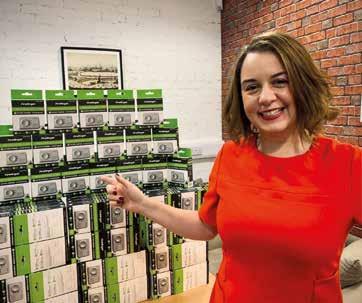
APPG member Sir Peter Bottomley MP, who gave out

The UK is moving forward with decarbonisation but there is still a long way to go. We must remember that CO will remain a risk even when homes are decarbonised because the gas can be produced from barbecues, bonfires, generators, cars and motorised appliances such as lawnmowers and power tools.
■
Barry Sheerman MP is Labour (Co-Op) MP for Huddersfield, and Brother of the House
REGISTERED GAS ENGINEER | CARBON MONOXIDE AWARENESS 24 November 2022
Carbon Monoxide Awareness Week this month brings organisations together to help people stay safe from the ‘silent killer’. Barry Sheerman MP talks to Registered Gas Engineer about the Parliamentary work that goes on behind the scenes.
“A young boy in my constituency, Dominic Rodgers, was tragically killed from exposure to CO that had leaked into his bedroom.”
MP Stephanie Peacock helped to give away CO alarms to constituents

*Source: Beama Report 2022. https://www.beama.org.uk/resourceLibrary/estimated-fuel-bill-savings-from-heating-control-upgrades.html Individual energy savings are dependent upon existing controls, environment and lifestyle. ©2022 Resideo Technologies Inc. The Honeywell Home trademark is used under license from Honeywell International Inc. Every crisis needs a hero Upgrading from a mechanical thermostat to our T3 programmable thermostat can save your customers up to £181 per year. * Installers. This is your time. Scan for more information.



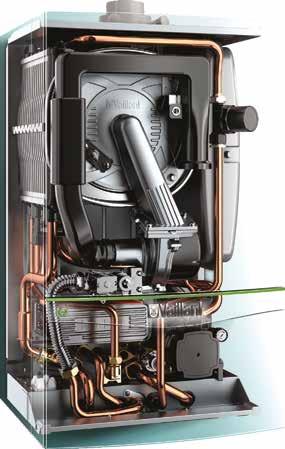
SCAN ME Install innovation. Why wait? Join Advance today and get £100 CASHBACK* when you register your first ecoTEC plus or ecoTEC exclusive boiler. Use code RGE22 and get 50 extra credits to spend in the Advance catalogue. *T&Cs apply. Visit our website for more info. Partner with the pioneers of home heating For almost 150 years Vaillant has been at the forefront of research, design and development of innovative home heating technology. And we’re still pioneering. Our full system solutions synchronise seamlessly to ensure optimum efficiency, so your customers can enjoy increased performance, less energy waste, and a reduced carbon footprint. PUSH THE POSSIBILITIES OF HOME HEATING www.vaillant.co.uk








{Protocol: " eBUS "}
CO safety for vulnerable people



Think CO is one of the Gas Safe Charity’s established programmes to promote and support gas safety in the homes of vulnerable people. Here, the charity reviews its recent work.

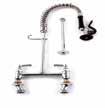

We know that most people have heard of carbon monoxide, but few of us think about it in our day-to-day lives, including when we are working or volunteering. Why would we? At the heart of our Think CO programme is getting people to think about it and to realise that, by doing so, they could save someone’s life.
This has never been more important than now, when the cost-of-living crisis is starting to see people engage in unsafe heating and cooking practices.
What the programme’s thousands of participants have in common is that they support vulnerable people in their own homes or manage teams of people who do this from across the public, charitable, housing and private sectors of the UK.
To enable people to “Think CO” when visiting or supporting vulnerable people, the programme keeps safety messages simple:
• Prevention: enable staff and volunteers to know more about CO safety so they can help the people they support to be more CO aware

• Practical: provide activities and resources to make front-line staff and volunteers more aware of the risks of CO poisoning
• Accessible: the activities and resources are all free; we cover the UK and we minimise jargon to make the key Think CO messages understandable and relatable.
Resources

The programme has developed a core set of resources to cover key CO safety messages, including,



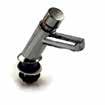





what is carbon monoxide, its sources, signs and symptoms, how to help prevent CO poisoning – in particular, servicing gas appliances by Gas Safe registered engineers and fitting alarms – and what to do if workers and volunteers suspect that someone they are supporting is at risk from CO.









Online hour-long workshops can be delivered online and face-to-face. A new schedule of
face-to-face workshops is being developed over the next year and will include at least one workshop in London, Cardiff, Edinburgh and Belfast.
The programme is about to relaunch its 45-minute e-learning course, as well as a quick course which takes about 10 minutes to complete.
Think CO is also developing an app that will remind people who have done the course or attended a workshop of the key safety messages, as well as where to go to find a gas engineer, and access the Priority Services Register. ■
volunteers of trusted organisations
Think CO
people in their own homes. To learn more about Think CO or access its resources, email thinkco@gassafecharity.org.uk

November 2022
Plumbing, heating and gas supplies... FAST! NEW CATALOGUE OUT NOW! • OVER 15,000 PRODUCTS • LOW PRICES • QUALITY PRODUCTS • FREE NEXT DAY DELIVERY* Order online bes.co.uk or call free 0800 80 10 90 BES RGE H131xW186mm ad 22 NEW.pdf 1 11/07/2022 12:52
is targeted at frontline staff and
who visit
Collaboration is key
The CO Research Trust brings experts together to improve understanding of carbon monoxide by commissioning, funding and sharing specialist research. Here, the charity reports on what it’s been doing over the past year.

While our understanding of CO exposure has improved, there are some critical areas where there is still much to learn. These are the diagnosis and treatments of CO exposure, and comorbidities that impact CO exposure, as well as the increased risk to vulnerable groups, including older people, pregnant women, and those on a low income or who are at risk of fuel poverty.
Each year we commission research projects that cover the broad spectrum of these issues. To date, the CO Research Trust has invested almost £3 million in research projects, and we have committed to investing a further £1.5 million in the next five years.
We have a continuous cycle of ongoing projects. As we commission new research, other projects come to an end. In the past year (2021/22), we saw the completion of the Solid Fuel Review. This project found that the lack of mandatory reporting of CO-related incidents from solid
fuels continues to be problematic. This means it’s difficult to establish an accurate picture of the risk of using solid fuels in UK homes.
From this, project lead Dr James Hanlon and his team have developed action points relating to the regulatory and policy landscape, incident data and research opportunities.
In October 2021 the project looking at the impact of CO on older adults was also completed.
There is a knowledge gap regarding ‘safe’ levels of CO exposure and whether chronic exposure to low levels of CO is associated with neuropsychological deficits.
Working alongside West Midlands Fire Service, the PhD project carried out by Beth Cheshire of Lancaster University examined the effects of exposure in an older population from household appliances such as cookers and heaters. Fire officers often report high levels of confusion in older residents who may be at risk of chronic CO
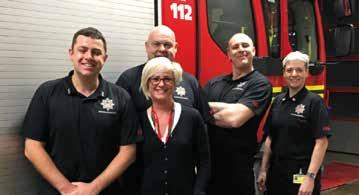
About the CO Research Trust
The vision of the CO Research Trust is a world where people are not exposed to CO. We fight CO poisoning by funding ground-breaking scientific research, to help improve knowledge and understanding of its effects on health. We believe this is the best way to effect change in this area.
By carrying out research and providing evidence, we hope to positively influence changes in legislation. Changes in legislation and increased awareness of risks are the two key pillars in the fight against CO exposure.
www.coresearchtrust.org
exposure, at levels that are not sufficient to trigger a CO alarm.
The project found that older adults may be more susceptible to the effects of CO due to reduced physiological reserve.
Raising awareness
In September 2021, we launched our autumn lecture series to share the findings of these and other critical projects, hosting an online presentation from one of our researchers every month until March 2022. The series shared the findings of our research projects with a wide range of industry and medical professionals and this awareness raising has been critical in helping us shape future research ideas.
We also launched a monthly blog providing expert opinion on some of the key issues, as well as a monthly newsletter to highlight events and news.
Conference 2022
In July, the trust held its inaugural in-person CO Conference. Over two days we brought together academics, first responders, industry professionals and researchers from around the world who are working on critical projects
to improve the understanding of diagnosis, treatments, biomarkers, and other ground-breaking research. This broad sharing of knowledge is an important part of the research process.
Awareness among medical professionals
Awareness among medical professionals of the symptoms of CO exposure is still not where we would like it to be, and a study is being carried out by a team led by Professor Heather Jarman at St George’s University Hospitals, London.
This is echoed by the study carried out by the NPIS looking at the reporting of CO exposures by healthcare professionals. The project concluded that Public Health policy should continue to focus on raising awareness of the dangers of CO. This is particularly important among vulnerable groups.
Increasing awareness of the risks of CO exposure among both homeowners and industry professionals is an ongoing project. We continue to focus on delivering the evidence that will demonstrate the need for change and increase understanding. ■
www.gassaferegister.co.uk 29 REGISTERED GAS ENGINEER | CARBON MONOXIDE AWARENESS
Beth Cheshire and the West Midlands
Fire
Service
“The Solid Fuel Review found that the lack of mandatory reporting of CO-related incidents from solid fuels continues to be problematic.”
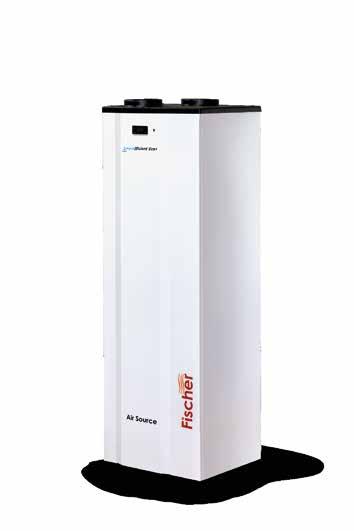

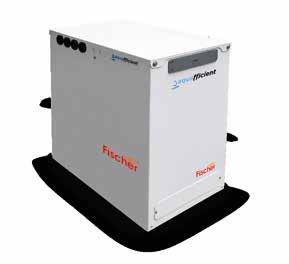

VISIT www.fischerfutureheat.com/training • ELECTRIC HEATING PRODUCT TRAINING • CLASSROOM AND ONLINE COURSES • JOIN OUR UK WIDE NETWORK OF INSTALLERS • ADD EXTRA SERVICES TO YOUR BUSINESS • FREE LUNCH PROVIDED! • THE FUTURE IS ELECTRIC • 100% EFFICIENT • AVAILABLE AS COMBI & HEAT ONLY • NO PCB’s = NO ERROR CODES • AIR SOURCE WATER HEATING • ECO FRIENDLY • RENEWABLE TECHNOLOGY • NO TANKS • INSTANT HOT WATER • PHASE CHANGE MATERIAL REGISTER TODAY FOR FREE TRAINING REGISTER TODAY CALL 0800 103 2723 SCAN MESCAN ME
Landlords’ gas safety record checks
Guidance on how to carry out a landlord’s gas safety record check, when it must be done and what it should include.

A gas safety check must be carried out by a registered engineer at least every 12 months on every relevant gas appliance and chimney/flue owned by a landlord and provided for their tenant’s use.
For new gas appliances, an annual check must be carried out within 12 months of installation. When tenants vacate the property, the landlord must ensure that gas appliances and fittings are safe before re-letting: appliances may have been damaged or removed, or pipework may have been left uncapped or open-ended.
chimney/flues
• Ventilation for sufficient effective free area and unobstructed throughout
• Appliance burner pressure or heat input, or both where necessary.
Note: a combustion performance test can be considered a substitute for a gas rate where it is not reasonably practicable to examine, for example, because of a faulty gas meter/no access or there is no meter.
• All flame supervision devices and/or other safety controls for correct operation.
A minimum visual inspection of
or the registration number of your employer
• Electronic signatures are permissible
• The date on which the landlord’s appliance or chimney/ flue was checked
• The address of the property where the landlord’s appliance and/or chimney/flue is installed
• The name and address of the landlord (or agent, where appropriate)
• Any gas safety defect identified and any remedial action taken
• A statement confirming that the safety check completed complies with the requirements of the GSIUR Regulation 26(9).
Does a new appliance need an immediate landlord’s gas safety record?
action to ensure the gas safety of their tenants.
What is the rule about carrying out LSGRs early?
A LGSR check may be carried out up to two months before the renewal date and the date will remain the same. If the LGSR check is due on 1 December 2022, it can be carried out any time from 1 October 2022. The renewal date for next year will then be 1 December 2023. If the check is carried out early, the landlord must be able to produce the previous two years’ records.
None of this affects the way you carry out the safety check. The rule is designed to minimise the risk of gas safety records running out and the tenant being left without a valid record.
Landlords must provide the new tenant with a gas safety record prior to occupation unless occupation does not exceed 28 days, in which case the record should be prominently displayed on site. The landlord must give their tenant a copy of the gas safety record within 28 days of the date of the check: a new gas safety check does not need to be carried out if the existing record is still valid.
What should you do as part of an annual gas safety check?
You must carry out Regulation 26(9) GSIUR safety checks on relevant gas appliances:
• Flue flow and spillage testing for correct operation of any
appliances may be required as per IGEM/G/11 to include location, flueing, ventilation, signs of distress, stable/secure and flame picture.
Investigate any evidence of unsafe operation of appliances, including following the gas industry Unsafe Situations
Procedure (IGEM G/11) if required.
Note: A tightness test is not mandatory but it is best practice.
What information must you record?
A landlord’s gas safety record must contain:
• A description of and the location of every landlord’s appliance and/or chimney/flue checked
• Your name and signature, and either your registration number
No, there is no legal requirement for this: however, some landlords/ agents do request a record. A new gas appliance must be inspected for safety within 12 months of installation.
Can I issue a landlord’s gas safety record if I find defects?
Yes. A landlord’s gas safety record is a record of the condition of the appliance at the time of the check. It is not a pass or fail certificate.
The record contains the results of the annual gas safety check. It should be issued on completion of the checks even if you find At Risk or Immediately Dangerous defects. It is a record that tells the landlord about the gas appliance that they supply for their tenants’ use. If defects are found, landlords must take appropriate
You must not post-date the record. You may add the extended renewal date on the record if you wish but this is not a requirement. ■
Further guidance
• The Gas Safety (Installation and Use) Regulations 1998 as
• Technical Bulletin TB 055
– Duties of Landlords
• Technical Bulletin 076: Electronic records and signatures
You can read and download Gas Safe Register Technical Bulletins by logging into your Gas Safe Register online account at: www.gassaferegister. co.uk/sign-in
REGISTERED GAS ENGINEER | TECHNICAL BACK TO BASICS www.gassaferegister.co.uk 31
“A landlord’s gas safety record is a record of the appliance at the time of the check. It is not a pass or fail certificate.”
amended
Gas rating smart meters
Guidance
The rollout of smart meters across the UK is continuing, with nearly half of all homes now using a smart meter. The latest figures from the Department for Business, Energy & Industrial Strategy (BEIS) show that nearly 11.5 million* gas meters are now ‘smart’ out of a total number of 23.3 million.
And although nearly 2 million of these are smart meters are operating in ‘dumb’ mode for a variety of reasons, it’s never been more important that gas engineers know how to gas rate appliances via a smart meter.
Why are electronic and smart gas meters different?
The complexities of the current range of electronic gas meters have caused some problems when attempting to gas rate an appliance, because the display does not immediately show the volume of gas passed by the meter. Each manufacturer has developed its own procedure to enable the gas rate process to be undertaken.
There are a number of different manufacturers of electronic gas meters (including smart meters) and Technical Bulletin TB 112 contains detailed information on how you can carry out a gas rate test, depending on the specific meter.
The meters covered by TB 112 are listed below, with more expected to be added to the Bulletin as time goes on:
• Landis+Gyr
• Secure Meters (UK) (formally PRI)
• Elster
• Flonidan
• Itron RF1 Sv ZB
• EDMI G6000
• EDMI 60A/60B.
How to gas rate an appliance
The following instructions give a general guide on how to gas rate an appliance that is connected to an electronic or smart gas meter. The exact method varies depending on the meter involved, and you should always check the manufacturer’s instructions first.
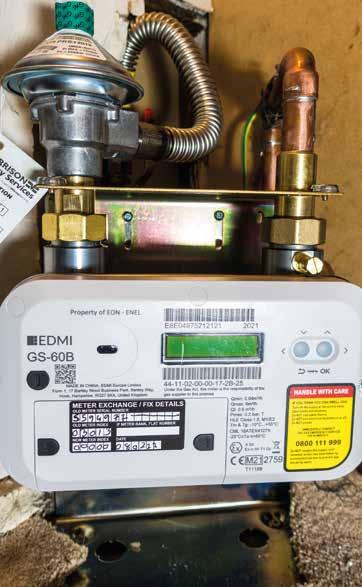
More detailed guidance on individual meters is contained in TB 112.
1) Start by running the gas appliance under ‘test’.
2) As you start the required two-minute test period, wake the gas meter display by pressing the correct button on the meter as outlined in the manufacturer’s instructions.
3) The display will light up. Depending on the meter model, you may need to wait a few seconds or press the button again a number of times until the meter index screen is displayed in m3. There may be a slight delay in the recorded index being displayed, but the index reading will be recorded from the moment of the first button press.
4) Make a note of the initial meter index reading.
5) After a short delay the meter display will go blank.
6) Exactly two minutes after starting the test, press the same button(s) as before to re-awaken the display and show the final reading in m3
7) Calculate the gas rate over the two-minute period by subtracting the initial reading from the final reading. Then calculate the hourly gas rate of the appliance using the normal method.
On rare occasions, due to delays in the electronic module communicating with the base meter, the described test method could suggest that the gas appliance under test is overrated by a maximum of 4 per cent. If you suspect this, repeat the test.
Note: When dealing with gas appliances connected to pre-payment meters, you should check that there is enough credit available to complete the gas rate check.
An amendment to Regulation 26(9) Gas Safety Installation and Use Regulations 1998, in April 2008, states: “Where it is not reasonably practicable to examine its operating pressure or heat input (or, where necessary, both), its combustion performance [can be taken instead].” ■
Technical Bulletin TB 112 –
Obtaining meter index readings for gas rating on electronic and smart gas meters – is available to read and download by logging into your Gas Safe Register online account at: www.gassaferegister. co.uk/sign-in
REGISTERED GAS ENGINEER | TECHNICAL BACK TO BASICS 32 November 2022
on carrying out gas rate checks on electronic and smart gas meters.
*BEIS, Smart Meters Statistics in Great Britain, quarterly report to end June 2022


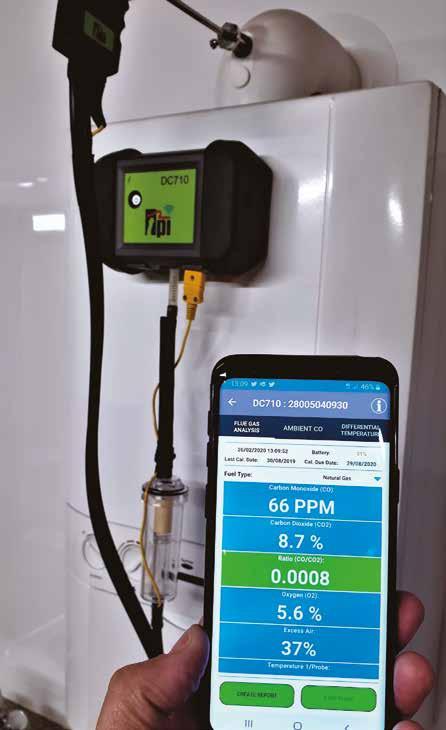

















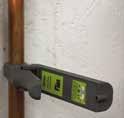















tpieurope.com | sales@tpieurope.com | call 01293 530196 DC710 & FREE View app Prices from £315 with a multitude of kit options available Future Proofed with a range of smart probes ROOM CO Pipe Clamps Pressure Airflow COEasy return & tracking of Annual Service through the TPI Customer Portal A Flue Gas Analyser, just Way, Way Smarter CO2 Legionella
Notification made simple
I
n England and Wales, you must report the installation of heat-producing gas appliances, such as boilers, warm air heaters, water heaters and gas fires, as well as the installation of heating and hot water systems connected to the gas appliance. The Building Regulations for England and Wales require you to self-certify that your installations comply with the regulations, and notifying via Gas Safe Register, or one of its approved third parties, is the only way to self-certify gas work.
You are not required notify work carried out in Northern Ireland or Scotland. However, you can still notify your work voluntarily and your customer will receive a Declaration of Safety Certificate. This confirms the work is safe and has been carried out by a Gas Safe registered business.
When you notify through Gas Safe, the Register will send a Building Regulations Compliance certificate to the homeowner or builder and will advise the Local Authority building control department of the work on your behalf. Homeowners cannot notify work themselves: it’s your legal obligation to notify.
• The installation/replacement and commissioning of unvented hot water storage vessels.
The installation of new:
• Vented hot water storage vessels
• Complete heating system (new or replacement)
• Replacing part of an existing heating systems which alters performance or requires recommissioning of the boiler, eg, resetting boiler input/output
• Adding to an existing heating system which alters performance or requires recommissioning of the boiler eg, resetting boiler input/output
• Installation or replacement of a new flue system/flue liner.
What information do I need to make a notification?
You need the job address, postcode, date of completion, customer’s name and address, the installing engineer, appliance work category, manufacturer, model, version and location.
What is NOT notifiable?
Flueless cookers, ovens or hobs are not notifiable under the Building Regulations.
However, many homeowners
How to notify
• You can notify through Gas Safe Register’s online notification system by logging into your online account.
Online notification costs £2.25 plus VAT per notification. Up to six items per address can be notified.
• Some manufacturers will notify the installation of an appliance for you: check directly with the manufacturer concerned.
• There is no mandatory requirement to notify gas work in Northern Ireland or Scotland.
You can notify by logging into your online account at www.gassaferegister.co.uk/sign-in More information at: www.gassaferegister.co.uk/engineer/resource-hub/ notifications/
notifiable, and Gas Safe Register does not provide a reporting service for other fossil-fuelled appliances or for electrical or bathroom plumbing work.
Micro-CHP and heat-pump installations should be notified in advance to the local authority, which checks the installation for compliance with Building Regulations and provides a completion certificate.
Unvented cylinders
Levelling Up, Housing and Communities (formerly MHCLG).
If you want to notify the installation of an unvented cylinder through Gas Safe Register, you must have supplied evidence of your G3 cylinder qualification to Gas Safe previously. This is because G3 is a plumbing qualification and not ACS accreditation, and so your accreditation is not sent to Gas Safe automatically. ■
The types of work that must be notified are:
• The installation/replacement and commissioning of heating and hot water boilers, warm air heaters, independent space heaters (fires), water heater/ circulators; flued cookers and cooker-boilers.
expect them to be notified: if they want to receive a certificate for cooker installations, you can report that through the notification system. You can also report work by telephone if you wish. The cost is £3.60 plus VAT per notification.
The installation of new gas pipework or carcass is not
An unvented cylinder can only be notified via Gas Safe Register if it is connected to a heat-producing gas appliance. Unvented cylinders connected to a non-gas appliance are not notifiable through Gas Safe Register: you must notify these through a relevant authorised scheme, as required by the Department for
Note: Homeowners or responsible persons cannot make the notification themselves. The Building Regulations state that registered businesses must notify heat-producing gas installations and any newly installed heating or hot water system they serve, including boilers, warm air, water heaters and gas fires.
REGISTERED GAS ENGINEER | TECHNICAL BACK TO BASICS 34 November 2022
“If
you want to notify the installation of an unvented cylinder through Gas Safe Register, you must have supplied evidence of your G3 qualification to Gas Safe previously.”
The requirements and process for notifying
the
installation of some appliances under
Building
Regulations. What is notifiable, what isn’t, and how do you notify?







Help your customers save energy with tado° Smart Thermostats Benefits Up to 31% energy savings1 2 3 4 We offer exclusive benefits for professional installers. Visit tado.com/pro. Simple to install and easy to use. Allows you to control rooms individually Compatible with almost all heating systems from different manufacturers. In collaboration with:
What will help people decarbonise their homes?
What policies do homeowners need to support decarbonisation of their homes? A citizens’ panel put
together by the Climate Change Committee and Lancaster University has analysed the status quo, looked at where the gaps are and provided some key messages for the government.
The CCC says there are significant risks in the government’s current approach to scaling up low-carbon heat installations to achieve its 2050 net zero target. Among these are the lack of support and policies for homeowners who are not eligible for subsidised energy efficiency improvements.
Concern about climate change is high but awareness of the changes homeowners need to make is low. And so the citizens’ panel set out recommended actions and policies that will support them, drawing out some key points that will need to be addressed.
In a letter to BEIS minister Graham Stuart, CCC chair Lord Deben wrote that “homeowners are willing to act and support a range of policies which would help them reduce their home energy use – reducing emissions and saving on household costs.” But it also highlighted that dialogue and information will be crucial.
with recommendations from the CCC’s recent Progress Report.
These include:
• The need for a long-term strategy that provides clarity to homeowners and suppliers, and includes regulations to compel action, with these clearly signposted in advance of coming into force.
• The government needs to act to increase public awareness and provide access to trusted energy advice.
• Energy Performance Certificates need to be updated so that they provide clear a record of the retrofit work required and completed in every home.
• Further policies should provide incentives for homeowners to improve their homes, such as a stamp duty reduction or rebate, tax discounts, and propertylinked loans, alongside grants to support those least able to pay.
• Skills policies that ensure a supply of reliable, well-trained
The report also set out what people say they will consider when making such changes to their homes. These include: The cost of making changes: understanding what it will cost, whether it is affordable, what the payback might be, and over what time period.
A clear message from government: whether homeowners have received a clear, consistent and compelling message about what changes are needed and why, backed up by information, policy and legislation.
Future generations: consideration of the need to reduce emissions and address climate change, going beyond money and thinking about the impacts of climate change on different groups and future generations.
Support: the availability of loans, grants or other funds; clear, convenient information; communication through different channels including TV, social media and community groups.
The report makes it clear that people accept the need to make changes to their homes and are willing to act, but they need well-designed policies to help them do it. They expect the government to provide leadership on delivering the changes required to their homes to reach net zero, and they want it to set out clear, long-term policy programmes for doing so.
Consumers want and need clear, reliable and detailed information on the changes that will be needed in their homes to reach net zero and reduce energy bills. And they want a range of options.
Many of the panel’s recommended solutions align
installers, and services to support people in finding trusted contractors to work on their homes.
The panel proposed a package of measures to support decarbonising energy in their homes, which were refined and developed. The proposal is built around the ‘homeowner lifecycle’ in three stages: buying and selling, renovating and then living in a home.
Panellists designed interventions at each of these lifecycle stages to encourage home energy improvements, with support put in place to help homeowners through the lifecycle. This includes access to information through a logbook attached to
Independent advice: whether there is a trusted, independent source of information and advice, including real-life examples.
Impact: understanding what the biggest impacts are of different possible changes to home energy use, what changes are most effective, and which are small or insignificant.

A trusted and competent workforce: being able to find trustworthy installers, who are independently certified or regulated and have the right skills; avoiding ‘cowboy’ builders and installers.
Time: whether there is time to do the research and think about the decisions involved.
The level of disruption: how much ‘faff’ or disruption there will be.
Effects on the home: impacts on structure, space, comfort, aesthetics and resale value of their home.
their property and a cycle of five-yearly checks, based on an updated version of the current EPC model. Panellists designed
financial support packages that would be accessible at any stage of the lifecycle. ■
www.theccc.org.uk
REGISTERED GAS ENGINEER | ENERGY EFFICIENCY 36 November 2022
“People accept the need to make changes to their homes and are willing to act – but they need well-designed policies.”
Auto-balancing TRVs
Made for perfect balance.
Made for a permanently balanced heating system and reduced home energy bills. Reducing waste by an average of 8.8%, our auto-balancing TRVs ensure your customers are always happy, making cold spots and call-backs a thing of the past. They’re quick and easy to install too, helping you find more balance in your day.
Made for the UK, in the UK.
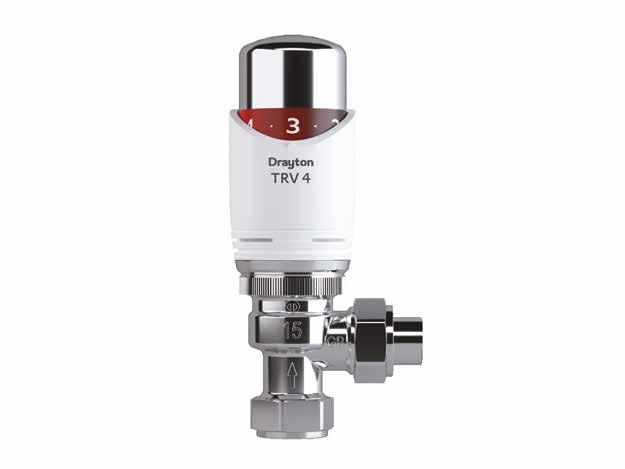
draytoncontrols.co.uk
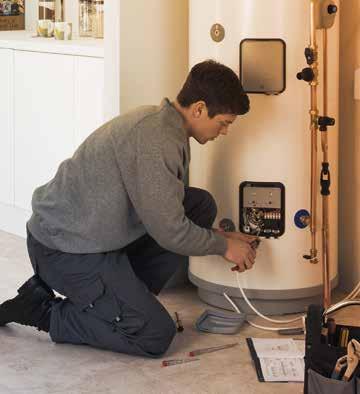
























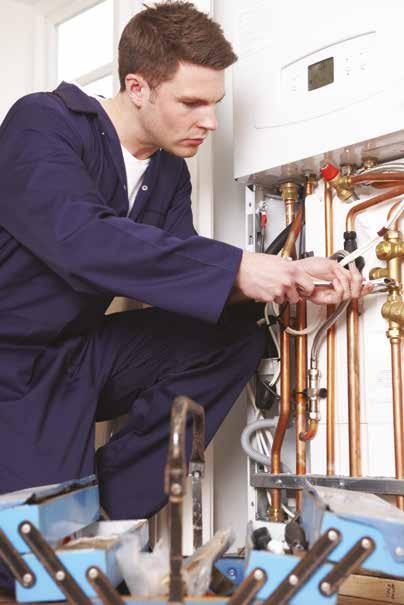


38 November 2021 The Obvious Choice Megaflo cylinders aren’t just easy to fit, they’re easy to recommend. When it comes to recommending a hot water cylinder, Megaflo is the obvious choice. heatraesadia.com/TheObviousChoice Fit Once™ the benefits are clear □ Vaillant, Glow-worm & Heatline compatible □ Quick and easy to fit □ Smart technology – no drain to service □ Increased customer satisfaction: Lower cost Longer warranty Lasting serviceable design Less waste To find out more or buy direct from UK Manufacturer go to www.buycombi.com FIT ONCE IT FITS THE BILL? ü ü ü ü
Tap into energy storage
Energy storage technology could play a big role in the journey to net zero as we look to bring renewable energy into our homes. Isaac Occhipinti, director of external affairs at the Hot Water Association, explores the untapped potential that’s already in more than 9 million UK homes.
The humble hot water cylinder provides households with all their hot water needs. But did you know that it can also act as a thermal battery, storing excess energy in the form of hot water and supporting the grid during times of lower demand and higher input?
The Hot Water Association (HWA) has long supported the concept of a home battery, using the domestic cylinder to serve a household’s hot water needs while also using ‘free’ energy. And it seems that energy companies are starting to realise the opportunity that hot water cylinders can offer to the wider grid.
Cylinders often have spare water that could be heated with an electric immersion heater. With the right set-up, households can allow the system to turn on their immersion heater at these times, using up that excess electricity.
Some energy companies pay
8.7kWh, with a range of anywhere between 90 litres (5.2kWh) and 300 litres (17.kWh). This is comparable to the storage capacity of a home battery system from brands such as Tesla, Sonnen, Powervault and Moixa. With more than 9 million domestic hot water cylinders installed, we have potentially 70GWh of untapped energy storage (around seven times the capacity of the UK’s largest pumped hydro facility, Dinorwig in Wales).
Connected hot water cylinders can deliver a similar service to the grid to that of home battery storage systems, but with a considerably lower environmental footprint. For example, a home battery consists of upwards of 100kg of materials such as cobalt, lithium and copper, which all come with a hefty environmental footprint. In comparison, a modern hot water
significantly reduce the carbon intensity of grid electricity.
consumers to use their excess grid electricity, making home battery storage a very appealing choice. One provider plans to use its customers’ hot water cylinders to create a virtual power plant that could help prevent future blackouts.
Potential
The energy storage potential associated with the UK’s installed capacity of domestic hot water cylinders is comparable to our entire fleet of pumped hydroelectric storage. With just a fraction of this resource, it would be possible to absorb the largest surpluses of renewable power that arise from offshore wind and solar PV.
A standard 150 litre hot water cylinder can hold approximately
cylinder weighs around 30kg and is made from recyclable materials such as stainless steel.
Hot water cylinders also come at a lower cost: one can be installed to provide grid services for around £200 per unit. When you compare this to a home battery storage system, which currently costs upwards of £3,000 without installation, the savings are significant.
Tapping in
The government wants to deploy low-carbon technology to ensure the UK transitions to net zero by 2050. The list of measures includes a target to quadruple wind power production by 2030. This, alongside the deployment of more nuclear energy, will
In response to these market dynamics, hot water cylinders are available that operate with conventional gas boilers but can also make use of low-carbon electricity whenever there is an over-supply of wind or solar generation relative to demand.
The Climate Change Committee has identified that load shifting through behavioural change will be a key part of our transition to net zero. In particular, pre-heating as opposed to peak heating is essential and, for this, we need to encourage the uptake

of flexible energy storage through domestic hot water cylinders and smart controls.
From a consumer’s perspective, replacing an old hot water cylinder with a modern, well-insulated cylinder, coupled with smart controls, provides an opportunity to use low-cost or even negatively priced electricity alongside their existing heating equipment.
Additional benefits such as ease of control, enhanced system boiler efficiency and future retrofit options for heat-pumps or hydrogen-ready gas boilers add further appeal. ■
Find out more
To help consumers understand the potential untapped energy in their homes, HWA will be running an awareness campaign in the coming months, with a dedicated webpage www.hotwater.org.uk/connected-hot-water-cylinders
We hope the campaign will help engineers educate their customers on all the hot water and energy options available to them. hotwater.org.uk/members
www.gassaferegister.co.uk 39 REGISTERED GAS ENGINEER | WATER HEATING
“One energy provider plans to use its customers’ hot water cylinders to create a virtual power plant that could help prevent future blackouts.”
Heating water the hybrid way
Combining a heat pump with a combi boiler is a viable first step for homeowners who are keen to run a more energy-efficient home. But correct specification is key when it comes to recommending the right hybrid approach for each household’s hot water demand, writes Darran Smith, technical manager for Alpha.
The domestic heating sector will go through a genuine revolution over the next few years, with the government regulating a shift away from the traditional gas boiler into a low-carbon future.

One option we have been discussing with our installers is a hybrid approach to heating and hot water provision. A heat pump is installed to provide space heating, with a boiler retained (or updated) to provide hot water. The hybrid system works equally well with a heat pump and combi, LPG or oil boiler, so it’s a good option for off-gas grid homes too.
But with hybrid and hot water provision, it is not simply a case of one size fits all. The main consideration with all hybrid systems is to correctly establish the overall heating demand and hot water requirement. Installers will need to understand the demands of the household and
Conventional system boiler + heat pump + cylinder
A conventional system boiler combined with a heat pump and a hot water cylinder. With this layout, either the heat pump or boiler is drawn upon to provide the heat when required.
With a large proportion of homes having limited space and a combi already in place, the first solution is generally proving to be the most popular and is arguably the best choice. Homeowners don’t suffer any losses in terms of needing to find the additional space required for a new cylinder, and they don’t need to factor in recovery time while the cylinder recovers its hot water reserve. Plus it costs less to install.
However, for homes with larger families, who will have greater hot water requirements, the second option is the best choice because it has the benefit of the larger cylinder. The flow rate is therefore
losses are not at their optimum. This is because you always have the back-up of a boiler to top up the shortfall.
constraints of the property in order to specify the best solution. Armed with this knowledge, you can look to one of two common layouts for a hybrid heat pump with boiler.
Combi + heat pump
The simplest and most compact layout is pairing a combi boiler with a heat pump. The boiler takes care of the hot water and backs up the heating in colder conditions, while the heat pump is dedicated to the main heating load.
not impacted by the size of the boiler and a higher hot water demand can be catered for.
Either offers a practical solution for homeowners looking to reduce their monthly outgoings and incorporate renewable technology while maintaining a warm and comfortable home with hot water readily available.
A hybrid system will choose the best heat source, depending on energy prices and temperature. It can work in both higher-demand situations and systems where design or heat
Presenting the idea of a hybrid heating solution to your customers can be likened to buying a hybrid car rather than standard petrol or diesel. The majority of its day-to-day use is via electric, and the fossil fuel is there as the fall-back for longer journeys when required. A hybrid heating system is similar in that most of the heating season is met solely by the heat pump and the gas boiler is only active for hot water recovery and heating during the coldest days.
A commonly raised topic with hot water, especially with heat pumps and renewable input, is the need to raise the water temperature to at least 60ºC on
a regular basis to remove any risks of legionella bacteria. With a combi boiler, there is zero risk as no hot water is stored; while a conventional boiler heats the cylinder to the necessary level to eradicate any risk.
Regardless of which hybrid boiler/heat pump approach is taken, it is vital that you understand the requirements of this sort of system and you will need to ensure that it is set up correctly for optimum heating and hot water performance.
Diverting away from the familiar scope of a pure gas boiler installation may feel a challenge but it is also an opportunity to extend your business into new areas; and support and training are available out there to help you on the journey. ■ alpha-innovation.co.uk
REGISTERED GAS ENGINEER | WATER HEATING 40 November 2022
“The main consideration with all hybrid systems is to correctly establish the overall heating demand and hot water requirement.”
Save on cost and carbon
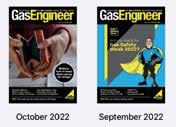
Rinnai’s latest CPD shows the carbon and cost savings achieved through investing in hydrogen blend-ready and BioLPG-ready continuous-flow hot water heaters.
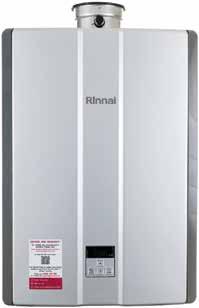
‘Carbon and Economic Benefits of Zero Storage in Hot Water Systems’ illustrates that Rinnai’s instantaneous hot water systems can provide significant savings in five key areas when compared with traditional storage systems: operational costs, capital cost, carbon footprint, space and weight.
Approximate savings achieved
by replacing a traditional storage-based system with a commercial Rinnai continuous flow hot water system amount to: 15-20 per cent of the running cost, 30 per cent of the upfront cost, 15-20 per cent in carbon footprint, 60 per cent in space, and 80 per cent in weight.

These cost and carbon savings calculations can be measured in a formula divided into three main steps that produce reliable and accountable results. The first step collects and processes data from previous real-life projects. This data is used
to understand more about peak loading conditions and usage patterns. The second step sizes the system according to the loading.
The third step is used to calculate the capital expenditure, operational cost, carbon emissions, efficiency, energy, performance, plant space, and weight.

Rinnai is a registered provider of CPD courses with CPD UK and CIBSE. All courses are designed to facilitate a better technical understanding of low-carbon heating, hot water delivery systems. Its products and services are based on H3 –Hydrogen, Heating and Heat Pumps, which enable residential and commercial sites to maximise energy efficiency and

performance. H3 products includes commercial heat pumps as well as hydrogen blend-ready and hybrid hot water heating systems.
■
• Search for training at www.rinnaiuk.com


REGISTERED GAS ENGINEER | WATER HEATING www.gassaferegister.co.uk 41
“Savings can be made in five key areas: operational costs, capital cost, carbon footprint, space and weight.” Text information to Martin on 07821 517 954 Email: Webuyplumbingstock@live.co.uk Chemicals Sentinel and Fernox Etc. Keep up to date with your app In these fast-moving times, your Registered Gas Engineer app can help you stay up to date with all the latest news, wherever you are. We’ve made important updates to your FREE app. So please make sure you choose ‘Update’ at your app store to unlock some great new features. Stay up to date – choose Latest News Feeds to see the latest news from Gas Safe Register and around the industry PLUS the newest products and jobs. Simply tap on the headline and the full article opens in simple, readable text. Find the latest technical articles, news and features, Technical Bulletins, Industry Standard Updates and Safety Alerts. Choose e-Journal replica to download and read 12 full magazine editions on your mobile device. *Available to Gas Safe registered engineers only. You’ll need to log in with your Gas Safe registration number for verification the first time you use the app.
Create a website that works for you
A well-built website is a key marketing tool for any small business looking to build credibility and get found online. Mark Krull from Logic4training gives his top tips on how to create an engaging website that converts visitors into paying customers.
W here is the first place people look to find a local gas engineer? In the past it might have been the local shop window or the Yellow Pages, but those days are long gone. For the 88 per cent of us who carry a smartphone in our pocket, finding and researching tradespeople online is more instant than ever.
To be in the game, businesses need to build a credible presence online, starting with an attractive and engaging website that covers services and locality, and displays positive reviews and testimonials. It needs to be relevant to your audience and updated regularly, with links to your social media accounts and external organisations such as Gas Safe Register.
Whether you are starting from scratch or making improvements to your existing website, here are some top tips on how to freshen up your content, improve search engine optimisation (SEO) and boost performance.

Getting started
There are plenty of options to get you started, depending on how confident you feel and how much time you have. DIY website building, including platforms such as Wix or Squarespace, is usually the cheapest option but they will take you a fair amount of time and effort.
It’s not just the build that takes time either: websites require ongoing maintenance and updating to ensure they are optimised for success, so if you are tied up with the other elements of your business, it might be best to get an expert web builder on board.
What does your website need?
Fresh images: upload a photo of your latest project, or you and your team
Video content: audio visual content is more engaging than still pictures and integrates well with your social media accounts Customer testimonials: make sure any great reviews you’ve received are front and centre Contact information and opening hours: make it easy for customers to call or enquire by using calls to action (CTAs) such as ‘call now’ or ‘get a quote’ Local services: be specific about the towns and cities where you work, would travel to or where your customers are from.
You will rank faster for these locations and attract customers who are local News and company updates: Have you expanded into renewables? Won an award?
Taken on new staff? Your website is the place to share your triumphs.
What is SEO and how do I make it work?
Once your website is up and running, you need to start making it work for your business. SEO is getting found by search engines under relevant terms and it’s crucial. If your site it doesn’t appear when a customer searches for gas engineers in your area, then it isn’t working as well as it could.
Improving SEO can be a complex process, but there are some quick and easy ways to boost your visibility and get found online.
Google My Business
If you only do one thing to improve your website, this should be it. Google My Business (GMB) is a great place for tradespeople to advertise their business without paying for anything. It’s a free business profile that provides your potential customers with quick access to contact details, website and location.
Your business will appear on
Google Maps and in local listings: when a homeowner searches for ‘gas engineer in Northolt’, for example, you want your business to appear at the top of the suggestions.
GMB reviews are by far one of the easiest, fastest ways to boost your ranking and start attracting more customers to your website. When you receive just
five reviews, Google will start to add a star rating next to your site whenever you appear in Google’s search results.
As a small business, getting online might seem like a daunting task, but ignore it and you are ignoring your target market. It’s time to shout about your skills online and draw in new business. ■ www.logic4training.co.uk
Quick tips for great SEO
• Create fresh, unique content across all media formats, including written, image and video. Make sure words and pictures are your own and that videos are well scripted, not too long and relevant to your audience.
• Update regularly because websites with active updates are more likely to appear higher in search engine results. Set aside some time every week to upload new images and your latest reviews to keep content fresh.
• Make sure your domain name is listed on all your social pages and your website links back to your social media platforms. If your business is listed on any other websites –for example, governing bodies, trade associations or review websites – link to these too. The more relevant external links, the better.
REGISTERED GAS ENGINEER | YOUR BUSINESS 42 November 2022



Future-proof your customers’ heating
Heating engineers who recommend underfloor to their customers are helping to future-proof them against future market changes, writes Chris Ingram, founder of Continal Heating.
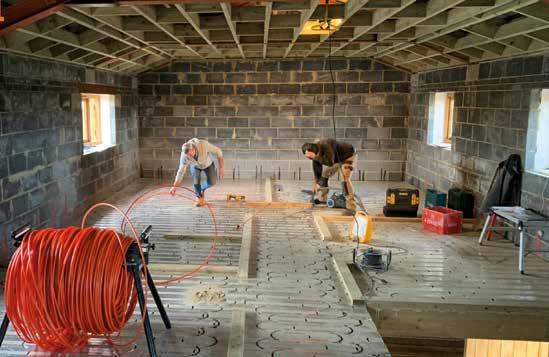
It’s hard to think of a time when the heating market has been so uncertain. The government has signalled its intention to phase out gas boilers in new-builds from 2025, and is encouraging owners of existing properties to upgrade their properties with heat pumps to boost their energy efficiency.
Meanwhile, rising gas and electricity prices are potentially forcing millions more homes into fuel poverty. Newspapers are full of headlines about people having to choose between eating and heating and, as winter approaches, everyone is looking for ways to keep their bills down as much as possible.
The government is clearly prioritising heat pumps as the potential mass replacement for gas boilers, but boilers aren’t going to disappear overnight, and it would be a mistake to forget all about them going forward.
There have long been questions raised over just how many householders would be willing to replace their gas boilers with heat pump technology, with which they are far less familiar and whose relatively high upfront costs make those questions even more
Planning ahead
Where does that leave heating engineers now and what should you be installing? Recent changes to Building Regulations require all new heating systems to be designed with a maximum flow temperature of 55°C. While this does not affect existing properties, the regulations do state that if an
heat pumps, hydrogen boilers, biomass or other efficient technologies in the years to come.
We don’t yet know exactly which of these technologies is going to come out on top, but what we do know is that any heat emitters fitted today will need to be suitable for use with as many fuel sources as possible, to futureproof against what lies ahead.
Get the design right
relevant right now.
Take-up of the Boiler Upgrade Scheme, which offers a grant towards the cost of installing heat pumps and, in some instances, biomass boilers in England and Wales, has been disappointing to date. Homeowners may well be reluctant to invest in this technology as everyone tightens their belts.
older system is being ripped out and completely replaced as part of a substantial refurbishment, then these maximum flow temperatures apply.
The government seems set on low-temperature technologies as the way forward for modern, energy-efficient UK heating systems, regardless of whether they will ultimately be fuelled by
Underfloor heating (UFH) works with all types of heat generators, from gas boilers to heat pumps and biomass boilers. Water-based UFH is the most efficient type of heat emitter and, when designed and installed correctly, will work perfectly with the cheapest, most energy secure fuel source whenever the property’s heating system is being upgraded.
Customers using UFH now will be able to easily make the switch from their current fuel source to whichever becomes mainstream, even more so because modern UFH systems should be expected to last at least 50 years – far longer than a new radiator. ■
The key to installing the most efficient UFH system is to get the design right long before you lay the first inch of pipework. Choose the best system for the desired final floor covering and floor construction, and you’ll need to carefully consider the sizing and building’s heat losses to make sure you achieve the desired heat outputs. You may also need a buffer tank.
Continal Underfloor Heating systems are bespoke and designed specifically for the installation. They can be supplied with full CAD designs, and there are systems to suit all fuel sources, building types, constructions and sizes. www.continal.co.uk
REGISTERED GAS ENGINEER | UNDERFLOOR HEATING 44 November 2022
“Any heat emitters fitted today will need to be suitable for use with as many fuel sources as possible, to future-proof against what lies ahead.”
Modifying boilers to run on vegetable oil waste
As the UK looks towards net zero, using hydrotreated vegetable oil (HVO) as a heating fuel can contribute to reducing carbon emissions and lead the way towards lowering NOx levels.
HVO is a fossil-free fuel, sustainably produced, renewable paraffin derived from used cooking oil and vegetable oil processing waste. It makes an excellent replacement for heating oil such as kerosene, requiring relatively simple and inexpensive changes to heating systems –and it can cut carbon emissions by 88 per cent.
Navien’s LCB700 Blue Flame boilers can be modified to use HVO simply by installing different nozzles, with no impact on performance. And because HVO can provide CO2 savings of 88 per cent, as well as reduce NOx emissions, the LCB700’s compatibility makes it the only domestic oil boiler capable of achieving an ErP A+ energy rating.
National technical manager Sean Keleher says: “With a lot of people – especially those in rural areas – still reliant on oil-fired boilers, it’s vital for manufacturers
and industry groups to join together and embrace HVO as a more environmental fuel. HVO is safer to handle due to its lower flashpoint, plus it’s biodegradable.
“Converting properties from using heating oil to HVO is a simple process and considerably cheaper in comparison to how much it costs to install a brand new, low-carbon heating system. For off-gas homes in particular, renewable technologies like heat pumps wouldn’t be an effective or ideal alternative. Given these benefits, HVO should be an attractive, future-proof proposition for the industry (and government) to get on board with.”
Fully HVO-ready and available as either a regular, system or combi boiler, in both internal and external models, Navien’s LCB700 Blue Flame range is lightweight (with lift weights from
only 67kg), easy to handle and optimised for simple, fast and cost-effective installation.

Boilers have a full text-driven, smart control panel and are simple to programme and use. This is supplemented by a built-in Intelligent Mode, a self-learning function that monitors DHW usage, ensuring there is always ample hot water available. ■ www.navien.co.uk

REGISTERED GAS ENGINEER | PRODUCT FOCUS www.gassaferegister.co.uk 45
“Hydrotreated vegetable oil (HVO) makes an excellent replacement for heating oil such as kerosene.” Did your Power flush fail? Try POWDER FLUSH! We succeed, where others fail! •We can clean microbore, one pipe and plastic pipe systems. •We offer zero risk “No fix No fee deals” If we can’t fix it, you don’t pay anything •Earn £100 Commissions for completed client referrals •We can fix blocked systems and blocked heat exchangers. •No need to replace or re-run pipes. Our Patented technology can clean out hard sludge build-up in any size pipe! WWW.POWDERFLUSH.CO.UK
Productnews
Cut and chamfer in one with DP50 pipe cutter
The Knipex DP50 pipe cutter for larger plastic pipes combines precision chutting with chamfering in just one step, with no need for deburring or readjustment.
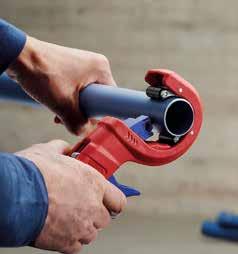
It’s suitable for all standard household plastic pipes (commonly drainage pipes) with a diameter of 32mm, 40mm and
50mm and a wall thickness up to 2.4mm The DP50 cuts easily, cleanly and smoothly, says the company, and the reversible blade can be changed without tools. It’s made of high-quality ball-bearing steel, ensuring a smooth cut.
Self-adjusting rollers with plain bearings guide the pipe to be cut so that the user’s view remains unblocked. The cutting blade is spring-loaded: once set, it exerts enough pressure so that no adjustment is necessary.
Trimming or fine cutting is possible from a section length of around 10mm. Pipes can be cut with a little safety allowance during installation and then precisely cut to the required length in a subsequent re-cut. www.knipex.com/ en-uk/dp50
Black edition and dark mode for Tado
Tado has introduced a black edition of its smart thermostat, along with a dark mode for the app. The company says these offer users a new way to complement their interior designs and accentuate personal taste.

Co-founder Christian Deilmann says: “We heard many users [were] looking for more ways to bring Tado into many different rooms of their home. A darker thermostat was much requested by the community, and we managed to find the right materials and design choices to bring this to the community in an elegant and sophisticated manner.” www.tado.com
Pumpless top-up pressurisation from Flamco
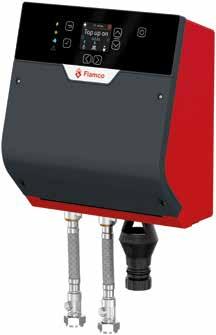
DeWalt packs in more power per charge
DeWalt has unveiled its most powerful battery, the Powerstack 18V 5Ah, which the company says enables 50 per cent more work per charge. Compatible with the company’s 18V XR tools and chargers, the battery also claims 50 per cent more power.

It has a 3-LED fuel gauge that displays the battery’s state-of-charge, helping users avoid unplanned work stoppages.
www.dewalt.co.uk/powerstack
Flamco’s new FlexFiller Direct G4 provides pumpless system top-up for sealed systems. The pressurisation unit is designed for small commercial and residential systems and is slim, wallmounted, and with a low flow rate – maximum 14 L/min, depending on the boosted mains feed water pressure. It’s designed to be connected directly to the building’s incoming mains or boosted water supply via the included flexible hose connections, and to fill a heating or chilled water system without the use of a pump.
UK managing director Sean Blandford says: “Introducing this unit in the UK has been something of a personal crusade for me. Customers have been asking us to provide this unit for a while and we have had to mount a concerted campaign to get an alternative solution recognised by the authorities.
“After a lot of work by our technical team in Holland and some interesting conversations with the authorities in the UK, we now have a quality unit available for customers to specify and for installers to integrate into installations as they wish.
“It’s a cost-effective option
with what we believe to be significant benefits when compared to similar equipment that has been available for many years. We have developed a well-earned reputation for impressive control technology and the controller on this unit offers a wide range of benefits you would find hard to match.” www.flamco.co.uk
REGISTERED GAS ENGINEER | PRODUCTS
46 November 2022
Online

Viessmann


Tel: 01952
Email: academy-uk@viessmann.com
www.viessmanninstallerportal.co.uk
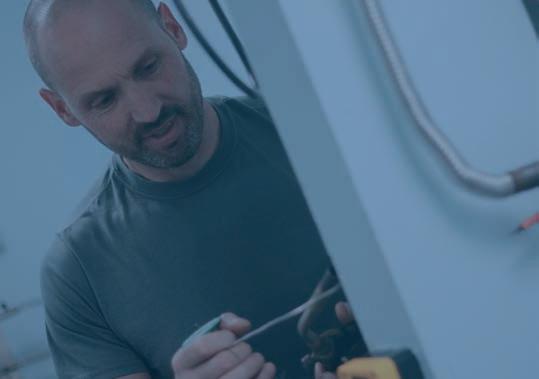
BUSINESS FOR SALE

www.gassaferegister.co.uk 47
Learn from a company that has over 100 years experience.
Learning Courses Sign up now - face to face training from April Online course booking: Register online Receive your login details Login and view all the current courses available Book your place at a time to suit
Academy
675032
Online course booking:
Celebrating 20 years of training excellence NORTHOLT | LUTON | BASILDON | SITTINGBOURNE







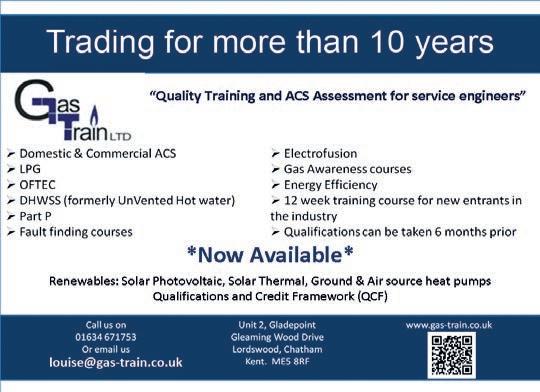



48 November 2022 LONDON AND SOUTH EAST Learn how to repair ALL types of combi/system boilers PLUS way, PLUS MUST know NEW • Parts Replacement and Service Day – get hands on experience removing and replacing boiler parts • Parts and Service days – max 3 people • Both courses can also be booked 1 on 1 to suit you • Company discounts available WOODYS TRAINING www.boiler-training.co.uk Online shop at www.boiler training.co.uk/shop Give us a call and we will help you: Tel: 01375 841804 Mob: 07958 783 681 Email: info@boiler training.co.uk Boiler Breakdown and Fault Finding PLUS Parts Replacement and Service Course theoriginalcourse Special offers on the day, FREE tea & coffee all day. FREE parking. LOOK ON WEBSITE FOR DISCOUNT CODES Woodys Training, Unit 62c Thames Industrial Park, Princess Margret Road, East Tilbury, Essex RM18 8RH Training & Assessment Specialists • Domestic gas & appliances • Commercial gas • Commercial catering • ACS re-assessments • New entrants to gas (GGFO) • Unvented hot water • Water regulations • LPG changeover • Legionella • 18th Edition Wiring Regulations • Electrical Testing and Inspection ✔ FREE PARKING ✔ COMPETITIVE PRICES ✔ NO V.A T. ✔ FRIENDLY STAFF Reigate Road, Ewell, Epsom, KT17 3DS www.nescot.ac.uk 020 8394 3280 gascentre @ nescot.ac.uk

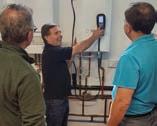
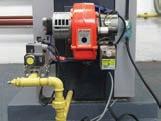





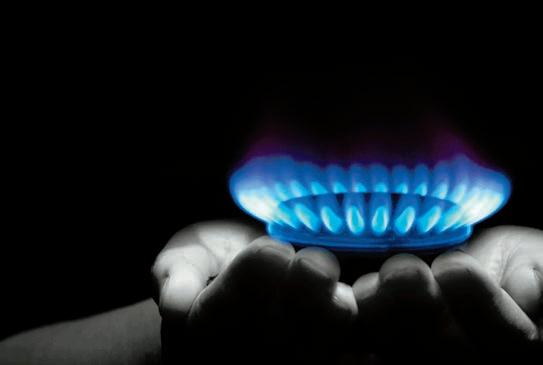



www.gassaferegister.co.uk 49 For more information and to book your course contact us on:- Email: sarah.bygraves@bromleytraining.co.uk Telephone: 0208 315 5678 Bromley Training & Assessment Centre (BTAAC) Unit 4 Ashgrove Industrial Estate Ashgrove Road, Bromley Kent, BR1 4JW BTAAC offer a full range of Domestic and Commercial Gas training and assessments in a well-equipped training facility at very competitive prices. · All ACS Domestic Gas – core + appliances ·All ACS Commercial Gas including CMDDA1 and BMP1 · Unvented Hot Water & Water Regs · Highly knowledgeable trainers with years of experience · Very friendly training environment LONDON AND SOUTH EAST EG Training Services Ltd - 3 Mulberry Court - Bourne Industrial ParkBourne Road - Crayford - DA1 4BF A friendly and professional service for all your Electrical and Gas Training and Assessment requirements. We offer short courses in the following Electrical Part P full scope Basic electrical safety 17th Edition Essential electrics Pat Testing ACS for Natural Gas and LPG All Domestic elements (Initial and Re Assessment) All Industrial/Commercial elements (Initial and Re Assessment) C Mobile Catering Commercial Laundry ommercial Catering Elements (Initial and Re Assessment) (Initial and Re Assessment) (Initial and Re Assessment) Commercial Meters (Initial and Re Assessment) Emergency Service Providers (Initial and Re Assessment) Flue Gas Analyser (Initial and Re Assessment) Other Courses Unvented Hot Water Systems New Entrant Basic Gas Utilization Course Water Regulations For Domestic or Industrial / Commercial Energy efficiency Training Needs Analysis Plumbing to Gas Engineering Bespoke Training and Assessment courses for Managers/Landlords/Agents Legionella Water Hygiene Oil Basic Pipe Skills Basic Understanding of Central Heating Systems 1 Day Gas Safety Awareness For further information on any of our courses please Phone 01322 524 792 Fax 01322 310 223 Email paul.chambers@egtrainingservices.co.uk Training Services ACS, NG, LPG Domestic, Commercial, Industrial Safe Electrical Isolation Un-vented Hot Water & Water Regs Celebrating 25 years of Quality Training & Assessments in Gas, Electrics, Plumbing & Heating and renewables 1997 - 2022 For more information visit www.gas-training-and-assessment.co.uk Telephone 01268 727797 Email gastraining@btconnect.com Gas Training & Assessment Ltd Basildon, Essex SS13 1EU Gas Safe Register number 170909 G.T.A 1/8 page.indd 1 15/12/2021 14:51 ADVERTISE YOUR TRAINING COURSES, SERVICES OR RECRUITMENT REQUIREMENTS TO 80,000 GAS SAFE REGISTERED BUSINESSES, AND REACH MORE THAN 132,000 GAS ENGINEERS. PLEASE TELEPHONE BEV: 0203 137 8582 OR EMAIL: classified@rgemagazine.co.uk



































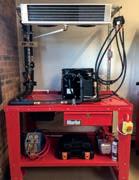























50 November 2022 TRAINING LITERATURE Offering training and assessments in: For all enquiries please contact our team: Primary Assessments 0115 9201144 ptas44@aol.com No3ngham, NG5 6BB www.primaryassessments.co.uk DomesCc Gas Commercial Gas LPG Unvented Hot Water Water Regs Legionella OFTEC Oil EXTENDED HOURS AND SAFETY DUE TO COVID-19 Introductory Gas Training Courses (Commercial, Domestic & LPG) ACS Domestic Core & Appliances and CPA ACS Non Domestic Core & Appliances ACS Commercial Catering, Mobile Catering & Appliances Swimming Pool Boilers ACS LPG Core & Appliances (incl Boats RPH, LAV, PD, Caravans) LPG Generators OFTEC Oil Assessment & Training (OFT 50, 101, 102 201, 105e 600a) & Solid Fuel Un vented & Vented Domestic Hot Water Legionella and Water Regulations Gas Supervisor Courses and courses designed for your specific needs EAL Electrical Courses and Electrical Part P Fire Alarm BS5839 and Security Lighting BS 5266 Energy Efficiency and Renewable Energy Courses (Solar, Photovoltaic) SOUTH WEST PENINSULAR TRAINING LTD Westover Trad ng Estate Langport Somerset TA10 9RB Te : 01458 253493 Email:info@swptraining co uk www swptraining co uk SOUTH WEST Serving London and the surrounding counties. With over 27 years training through expertise. Over 10,000 engineers through our doors. State of the art facilities. A name you can trust. www.gastectraining.co.uk • All domestic and commerical gas qualifications covered. • All LPG qualifications covered. • A large range of electrical qualifications covered. • All solid fuel qualifications covered. • All domestic and commerical Oftec oil qualifications covered. • Hot Water Systems & Safety • WRAS Water Regulations. • System controls. 01784 246 247 IR S UR E HEAT PUMP COURSES LI E MULTIPLE RIGS T E S PPR ENQUIRIES@GASTECTRAINING.CO.UK MIDLANDS SOUTH WEST F-Gas training for air-con, refrigeration and Heatpumps Cannock Chase Enterprise Centre, Block 3, Studio 6. Walkers Rise, Rugeley Road, Hednesford, WS12 0QU One Planet Renewables o er in depth F-Gas training at level 3, Categories I - IV WHAT WE OFFER * 3 Day Introduction to F-Gas * 5 Day Category 1, Level 3 F-Gas * 1 Day F-Gas Servicing Course * 1 Day Essential Basic Electrical Course * Hot Water Systems and safety (Inc. Unvented) * Flammable Refrigerants (Hydrocarbons) * WRAS water regulations * Energy E ciency * Oxy-fuel brazing FOR FURTHER INFORMATION PLEASE CONTACT US: 07828 144258 oneplanetrenewables@gmail.com www.oprtraining.co.uk Core Gas Safety Study Book 11 CCN1 Sections + CPA1 + Regulations + Key Word Index + FREE online training Designed to build on your knowledge and give confidence with exams WRITTEN BY A GAS ENGINEER FOR GAS ENGINEERS Thinking about your gas exams FREE online training & assessments with book www.ccn1.co.uk Learnatrade - 07975 830411 published & delivered by Learnatrade Ltd
Win a TapBoost Competition
Salamander Pumps and Registered Gas Engineer have teamed up to give three lucky readers the chance to win a new TapBoost pump.
Launched earlier this year,
Salamander Pumps’ TapBoost offers a cost-effective solution to improve the performance of a single outlet. The pump is designed to offer a solution when just one outlet suffers with poor water performance.
TapBoost is suitable for either a mains-fed or gravity-fed system – but it should not be installed to outlets or pipework-fed hot water from an unvented cylinder.

The in-line pump should be installed directly to the supply pipework of the outlet to be improved. It will boost the water flow to between 7-11 L/min, depending on the level of existing flow. For example, if a kitchen tap has a flow of 3 L/min, TapBoost will add approximately 4 L/min, giving a total of 7 out of the tap.

There must be a natural flow of at least 1.2L/min at the outlet to activate TapBoost.
The pump can be fitted in multiple locations around the house, including bathroom and kitchen sinks, bath taps, garden taps, toilet cisterns, dishwashers, and washing machines.
TERMS AND CONDITIONS
By entering this prize draw, you agree to these terms and conditions:
• Registered Gas Engineer and Salamander Pumps do not accept responsibility for lost, delayed, corrupted or invalid entries.
• The winners will be chosen at random from all correct answers submitted in accordance with these terms and conditions.
• The winners will be notified by email. The judges’ decision is final and no correspondence will be entered into.
• The prize cannot be substituted or upgraded.
• The prize is non-transferable and there is no cash alternative.
• Registered Gas Engineer and Salamander Pumps may disqualify you from winning if they have reasonable grounds to suspect that you are in breach of these terms and conditions or your participation is fraudulent or otherwise unlawful.
• This draw is not open to employees of Salamander Pumps, Gas Safe Register or Registered Gas Engineer or their direct family members or agents.
• Registered Gas Engineer and Salamander Pumps do not accept any responsibility for any network
3 Chances towin
How to enter
For your chance to win a TapBoost pump, worth £170, simply answer the following question correctly: How much natural flow is required to activate TapBoost?
a) 1.2L/min
1.4L/min
1.6L/min
Send your answer plus your name, registration number and address to competition@ registeredgasengineer.co.uk
Three winners will be chosen at random from all correct entries received by the closing date of Wednesday 30 November 2022.
connection, technical failure or other problem in any telephone line, network, system, provider or otherwise which results in any entry not being properly recorded or received.
• One entry per person.
• Your entry details will be provided to Salamander Pumps, which may use them for marketing purposes. By entering this competition, you agree that you may receive communications from Salamander Pumps. If you do not wish to be contacted, please add NO COMMUNICATIONS in your email entry.
www.gassaferegister.co.uk 51 REGISTERED GAS ENGINEER | COMPETITION
b)
c)



GET MORE BOILER JOBS SCAN THE CODE TO JOIN US JOIN US IT’S FREE visit www.boilerguide.co.uk/gassafe FREE BUSINESS WEBPAGE FOR INCREASED VISIBILITY GET THE BEST QUALIFIED LEADS IN THE UK ONLY PAY FOR THE JOBS YOU WANT NO CONTRACTS/SUBSCRIPTIONS OFFER YOUR CUSTOMERS FINANCE OPTIONS WITH OUR FREE TOOL JOIN US NOW DID YOU KNOW? WE ALSO PROVIDE NEW HEAT PUMP LEADS 80% OF OUR ENQUIRIES GO ON TO BUY A NEW BOILER BOILER INSTALLATION LEADS IN THE BUSINESS GET THE BEST Boiler Guide is operated by Leads.io Ltd.































































































































































































































